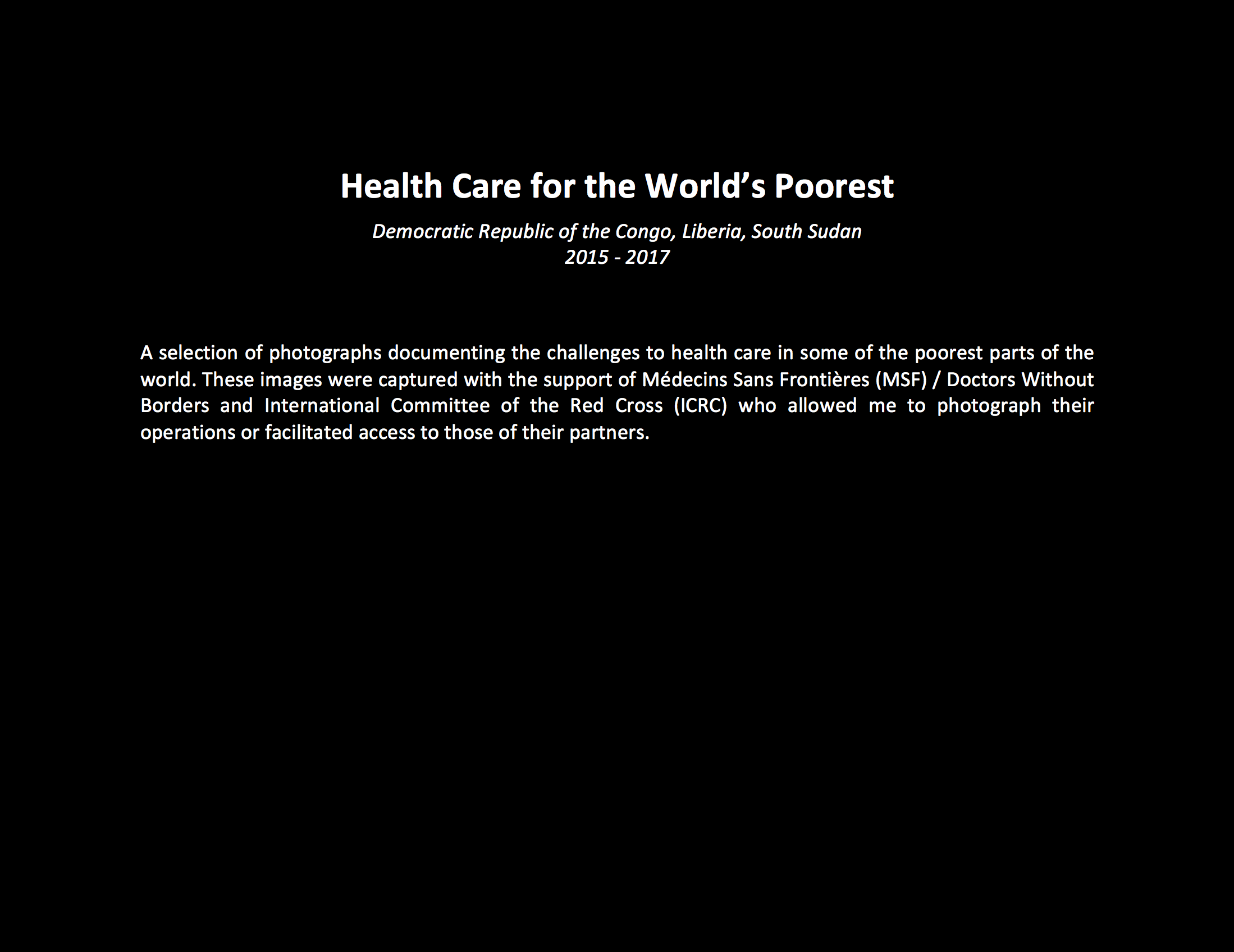
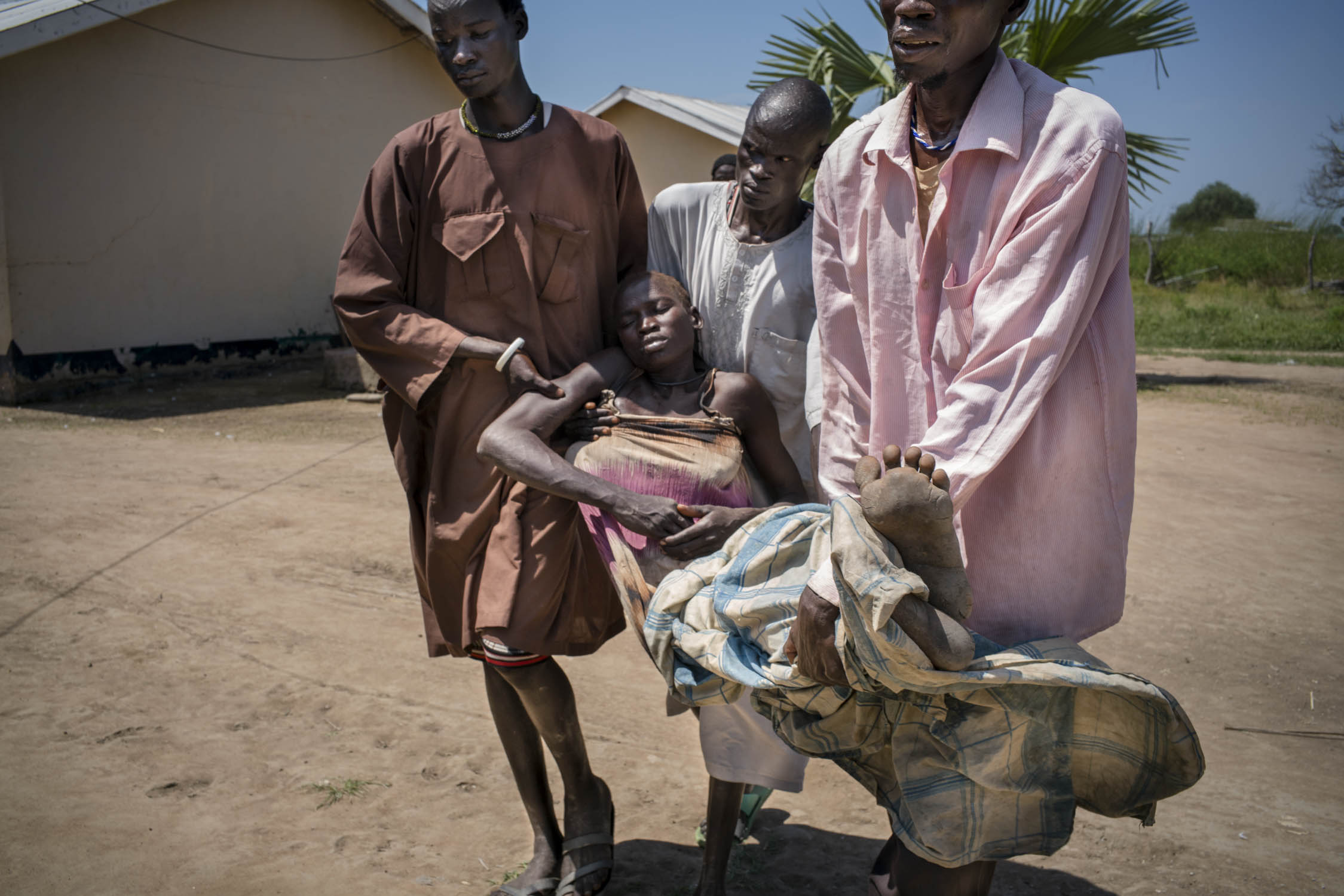
Arek Nuoi, 32, is carried unconscious by her three brother-in-laws to a ward at a government-run health care center, where she will receive urgent treatment for acute malaria. Her brother-in-laws transported Arek from their home village by placing her in a chair that they tied on top of a bicycle, and pushing the bicycle for one and a half hours to reach the health care center. South Sudan is host to one of the deadliest conflicts in the world, yet in 2015, malaria killed more people than bullets. Across the country, 2.28 million cases of malaria were reported. Panthou, Northern Bahr el Ghazal, South Sudan. October 14, 2015
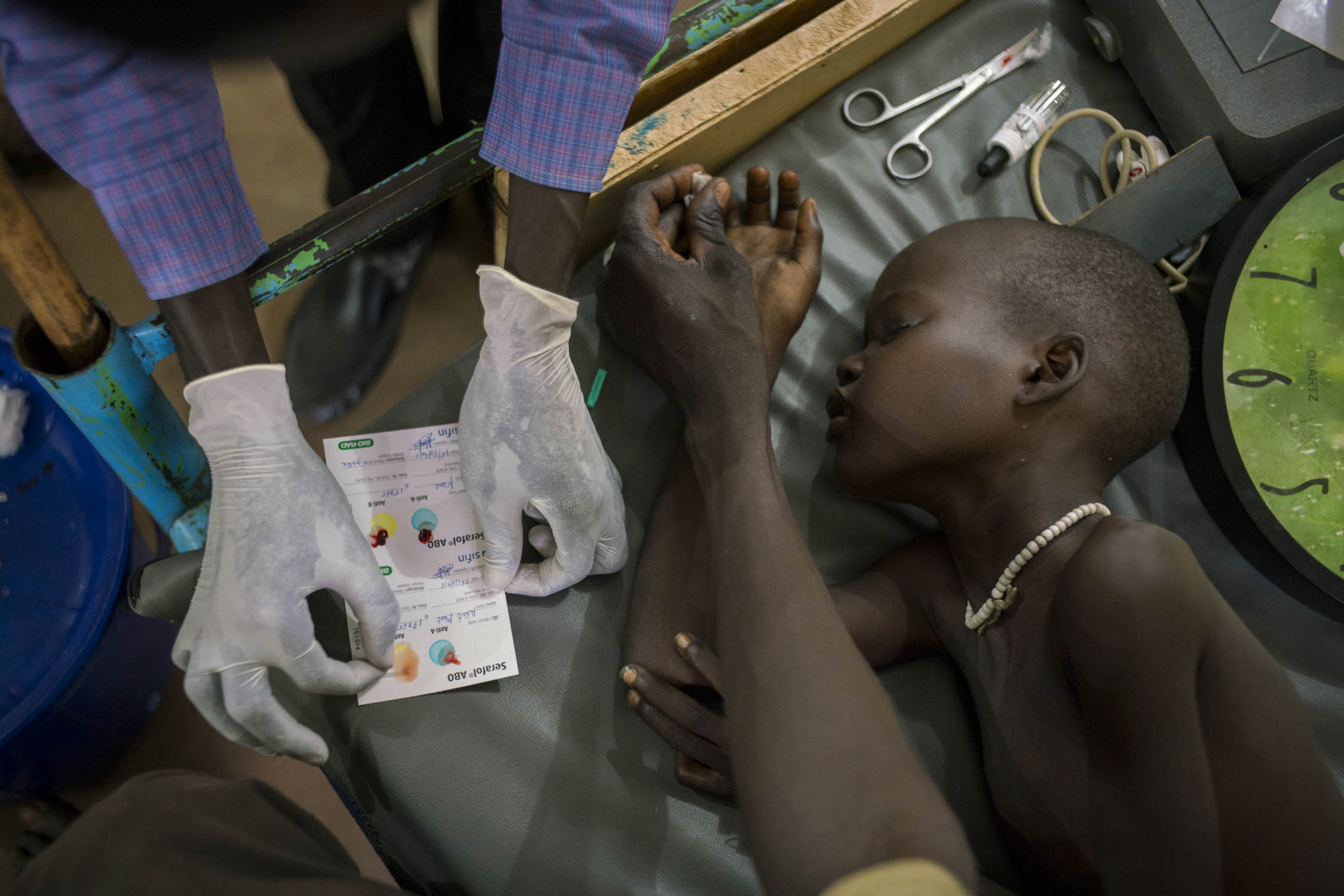
A nurse checks blood-type compatibility before administering a blood transfusion to Adut Chuor Kujal, 8, who is receiving treatment for cerebral malaria at an MSF hospital in Aweil city, South Sudan. Adut's father presses down on her fingertip that has just been pricked to obtain a blood sample. Adut's family lives in a remote rural village so she had been sick for several days before her father made the journey to Aweil. He had first taken her to a private clinic closer to their home but they had no malaria drugs in stock. South Sudan is host to one of the deadliest conflicts in the world, yet in 2015, malaria killed more people than bullets. Across the country, 2.28 million cases of malaria were reported. Aweil, Northern Bahr el Ghazar state, South Sudan. October 15, 2015
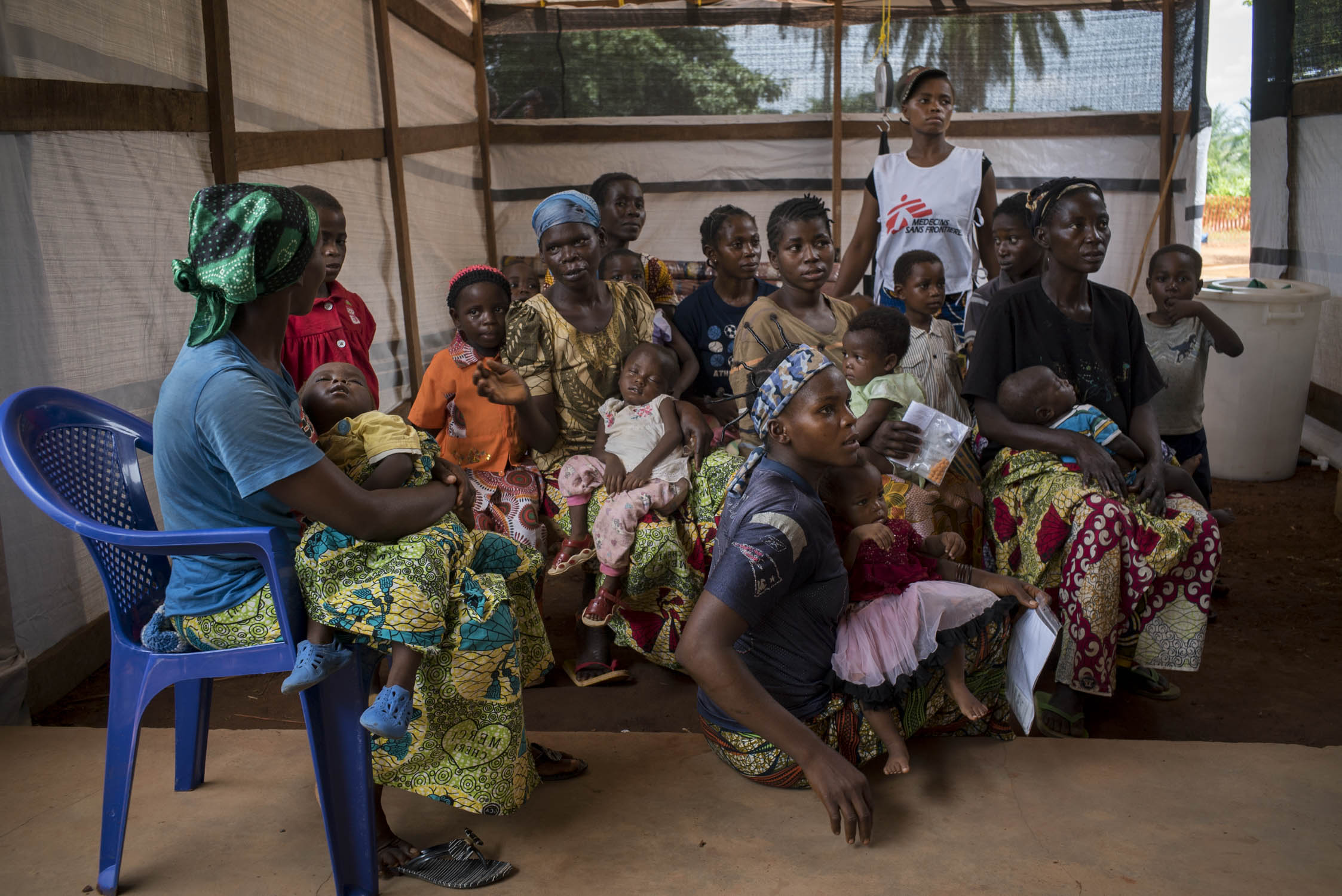
Mothers hold their sick children in the crowded waiting room of the MSF wing at a hospital in Monga, a town in a remote northern region of Democratic Republic of the Congo. MSF arrived to the area in response to a measles epidemic, therefore, only children with a fever were referred to the MSF wing. Monga, Bas-Uele province, Democratic Republic of the Congo. May 26, 2016
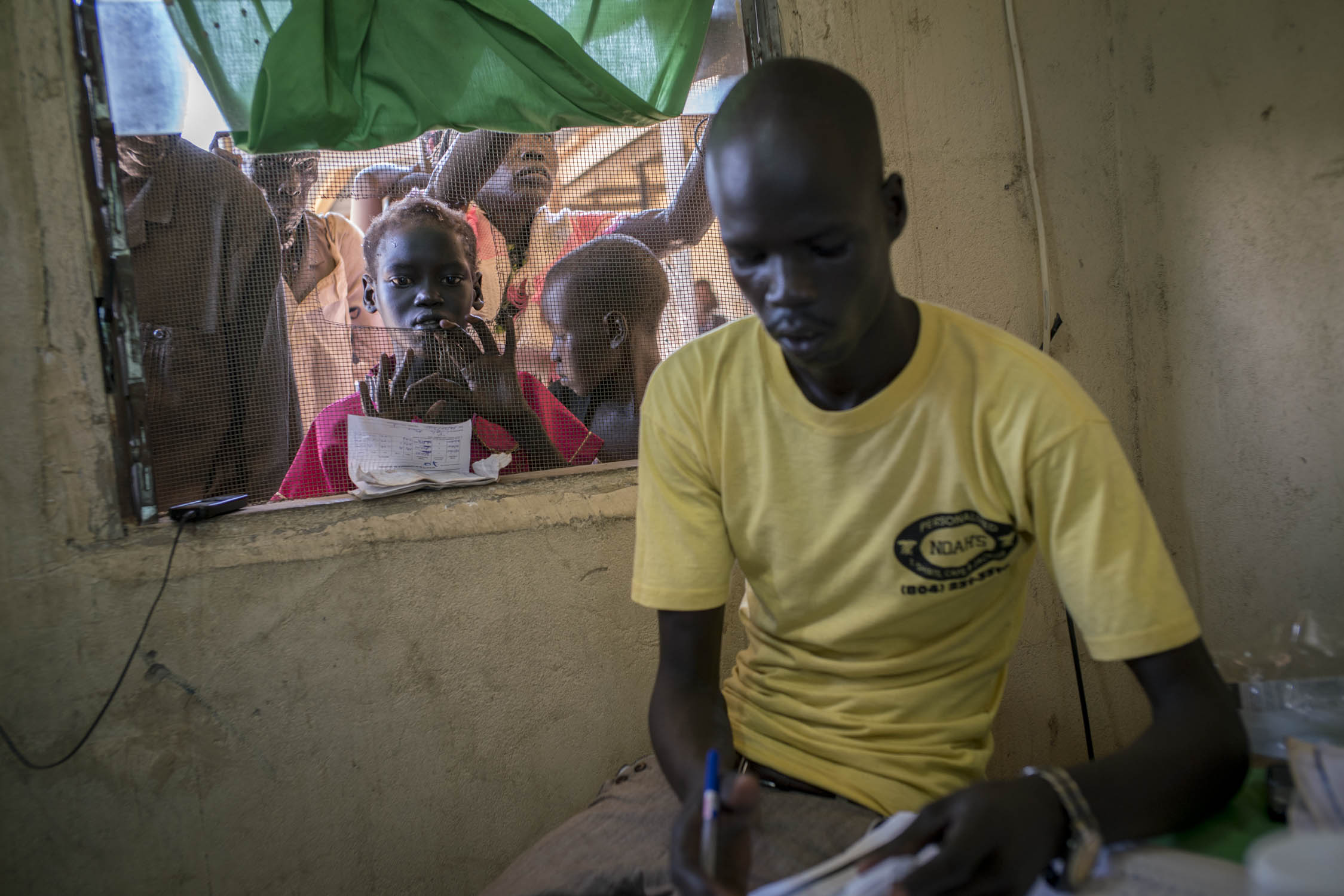
Patients wait to receive medicine at a health care center in Panthou village. Located in a remote rural area, the center was the only place in Aweil South county where patients might be able to receive free treatment and medicine for malaria. Only two staffs - both medical assistants - at the health care center are qualified to diagnose and treat patients. They treated approximately 150 malaria patients per day. The center had just received a supply of ACT oral medication for malaria, which had been out of stock for two months. The new supply was predicted to last one or two weeks. The only other medication in stock was quinine, but there was so little left that it was reserved for serious cases only. The center had no RDTs (rapid detection tests), so diagnosis was only done clinically based on symptoms observed. South Sudan is host to one of the deadliest conflicts in the world, yet in 2015, malaria killed more people than bullets. Across the country, 2.28 million cases of malaria were reported. Panthou village, Northern Bahr el Ghazal state, South Sudan. October 14, 2015
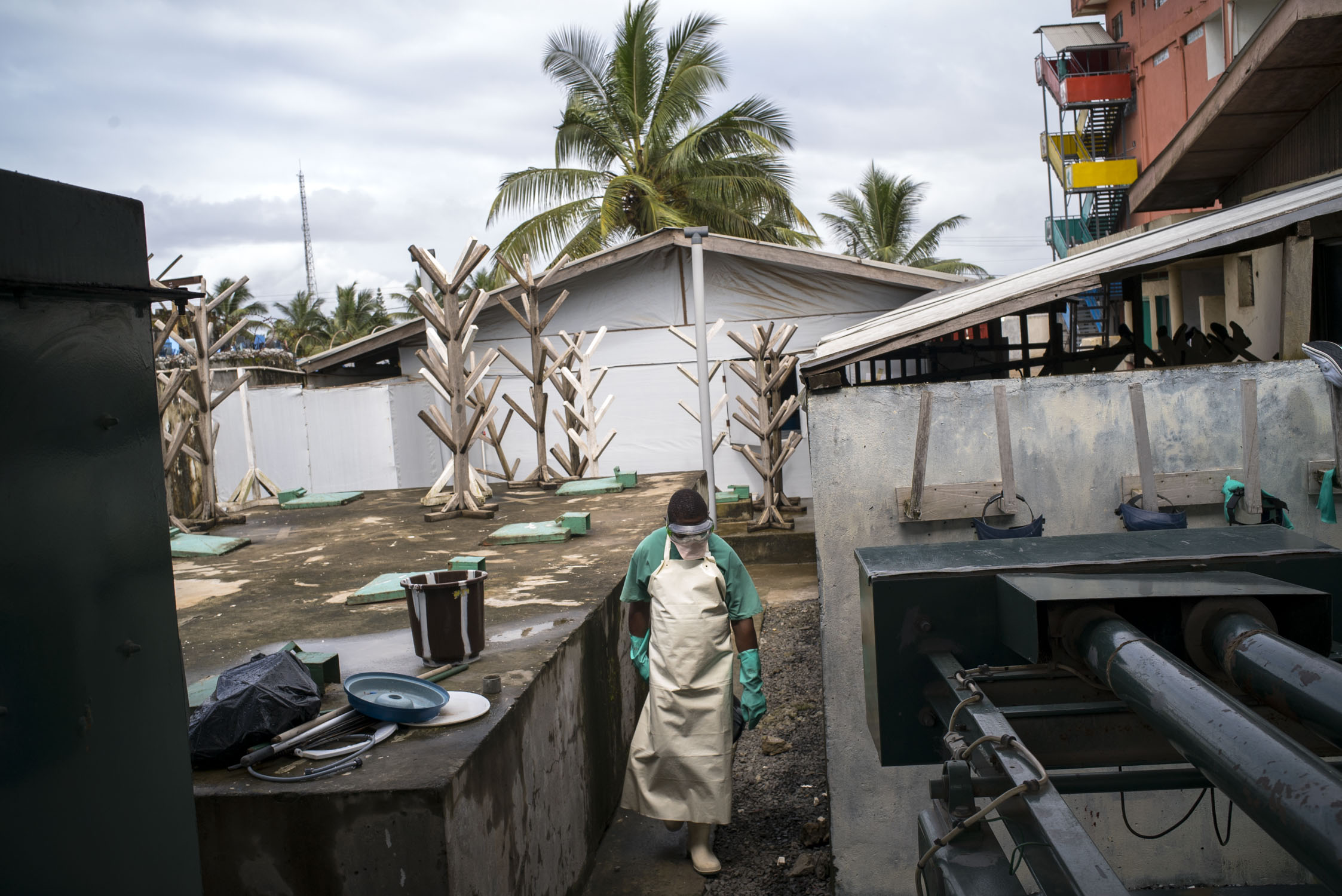
A sanitation worker walks though the back courtyard of an MSF hospital in Monrovia, Liberia. In the aftermath of the the ebola epidemic of 2014/15 that left an estimated 4800 dead in Liberia, the hospital adheres to especially strict routine sanitation measures. Monrovia, Liberia. Sept. 28, 2016
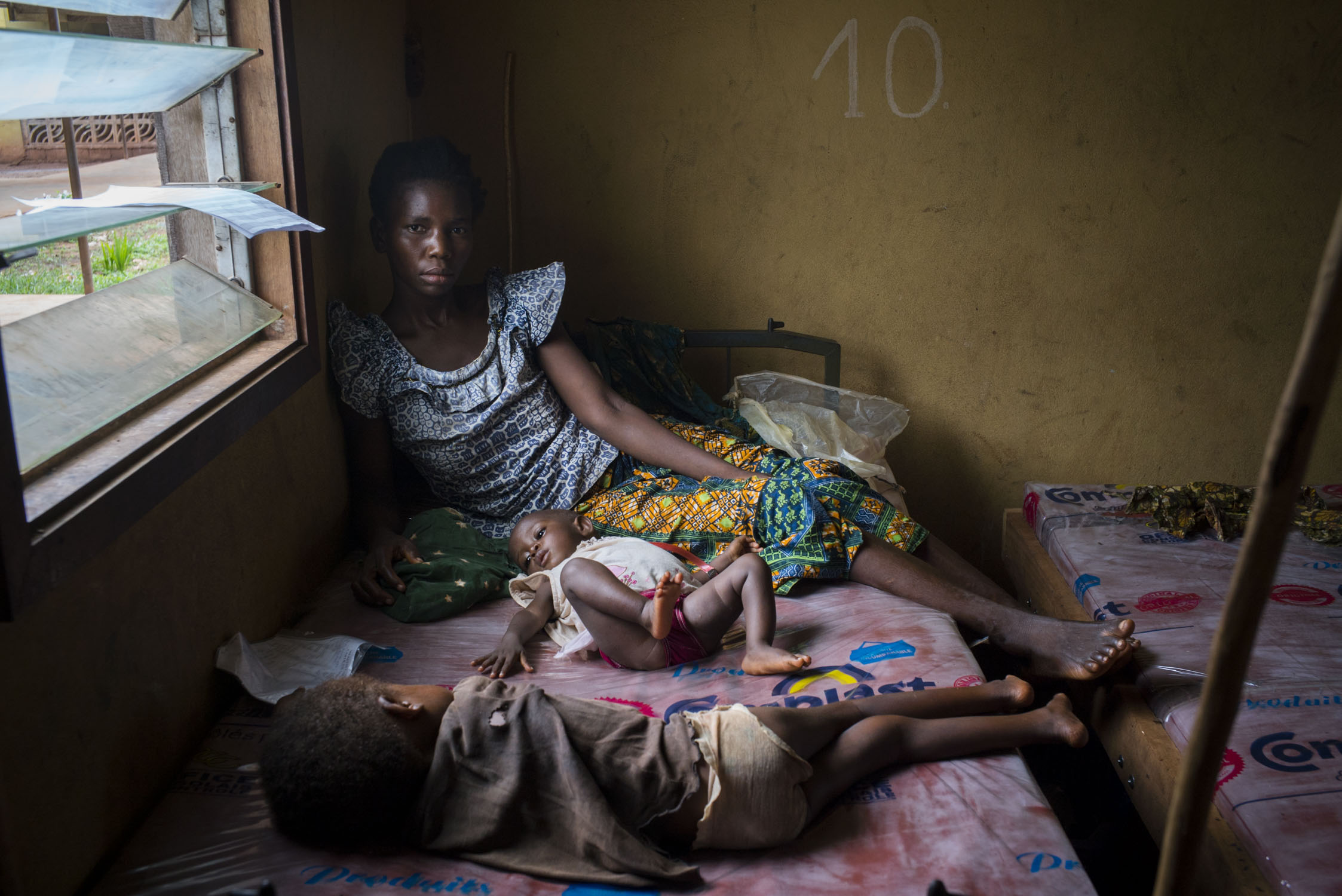
Madeleine Ngimambi, sits with her 7-month old daughter, Madeleine Pemu, who is receiving treatment for malnutrition in the MSF wing of the hospital in Monga, a town in a remote region of northern Democratic Republic of the Congo (DRC). Madeleine arrived to the hospital with both her daughter and son, after traveling 20 km on foot from their village, Faka. MSF was present at the hospital with the primary purpose of responding to an existing measles epidemic; however, they found many of the children admitted to their wing suffered from malnutrition. Monga, Bas-Uele province, Democratic Republic of the Congo. May 26, 2016
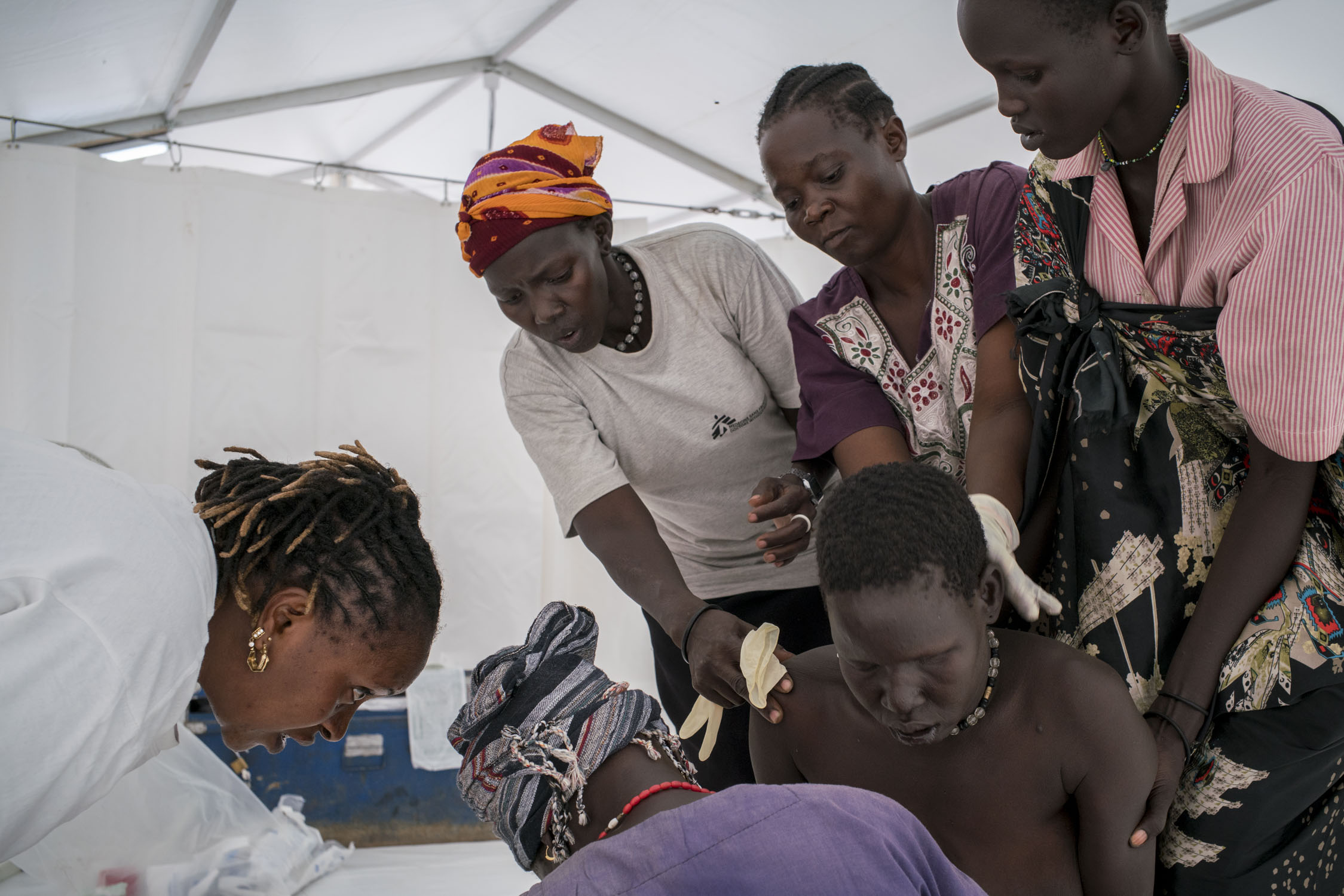
After an extremely difficult labor, a woman delivers her eighth child on her knees, assisted by a midwife, Rebecca, and her four assistants in a MSF hospital tent in the internally displaced persons (IDPs) camp in Bentiu. South Sudan has the highest maternal mortality rate in the world, in part due to the lack for health care facilities coupled with one of the highest fertility rates in the world -- after six children, giving birth becomes high risk. Rebecca said she had never seen anyone deliver on her knees before, and that the infant was not breathing or suckling as a newborn should, suggesting possible birth defects. The camp at Bentiu had a population of over 120,000, making it the second largest city in South Sudan. Bentiu Protection of Civilians (PoC) camp, South Sudan. October, 2015
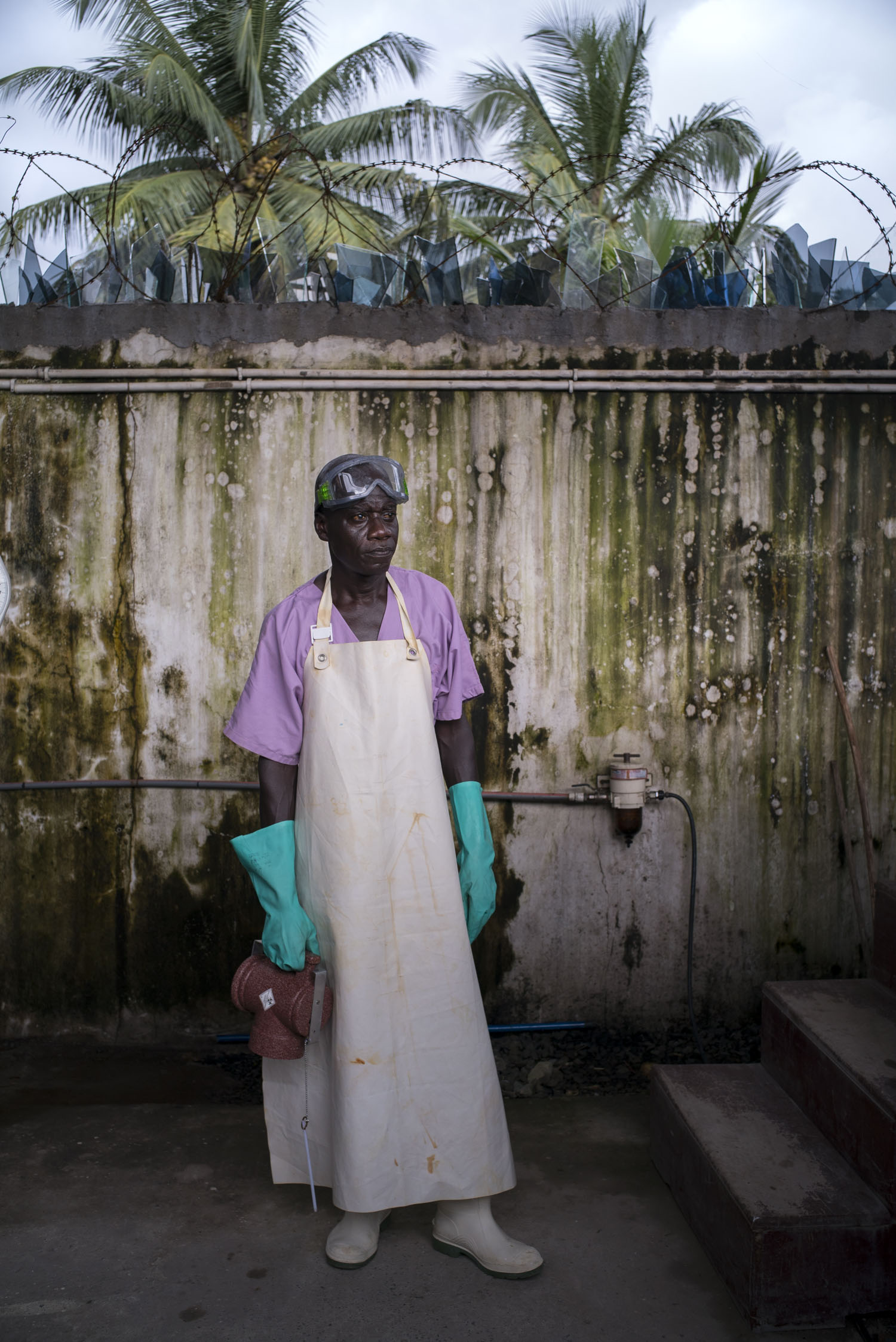
Alfred Walker, 52, Water and Sanitation Supervisor of an MSF hospital in Monrovia, Liberia, stands by the stairs leading to the incinerator, which is used for safe disposal of medical waste. In the aftermath of the the ebola epidemic of 2014/15 that left an estimated 4800 dead in Liberia, the hospital adheres to especially strict routine sanitation measures. Monrovia, Liberia. Sept. 28, 2016
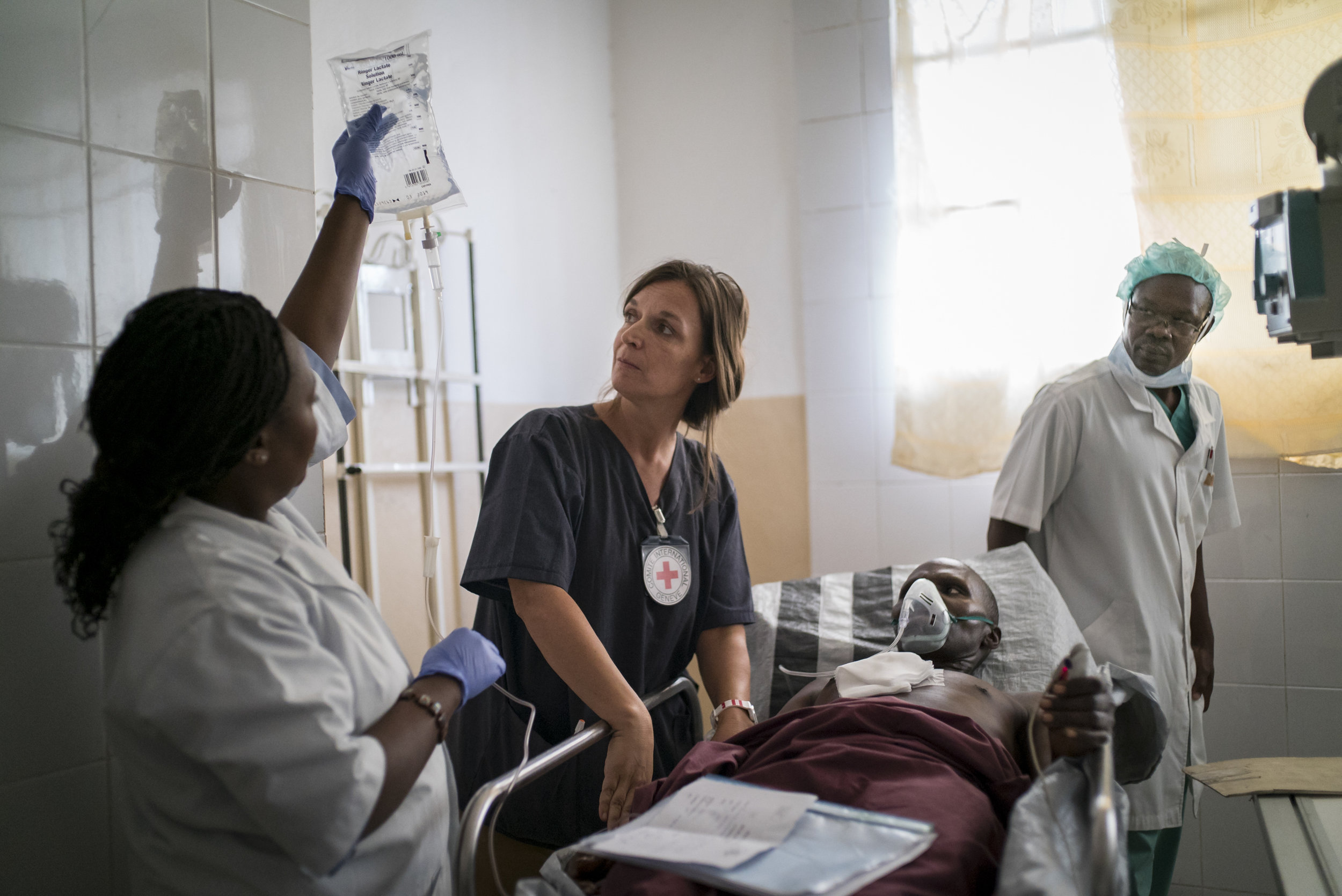
Anne Muller, the head nurse of the surgical team at Ndosho hospital in Goma, DRC, prepares a patient for emergency surgery. The patient, Patrick Gasana Wabazazo, 44, was shot in the chest (thorax) when he was caught in a crossfire between armed men on his farmland, one hour from his home village of Nyanzale, in Rutshuru territory. "I had just arrived to my field, when I saw an armed man who had already kidnapped one of the villagers. I saw another group arrive, and the gunshots began." Other villagers later found Patrick lying in his field. The bodies of two unknown men that had been shot dead in the gun battle lay nearby. The villagers realized Patrick was still breathing, so they took him to the village health center. The following day, UN soldiers med evacuated Patrick by helicopter to an ICRC hospital in Goma, where he was immediately taken into emergency surgery. Ndosho Hospital, Goma, Democratic Republic of Congo. August 30, 2017.
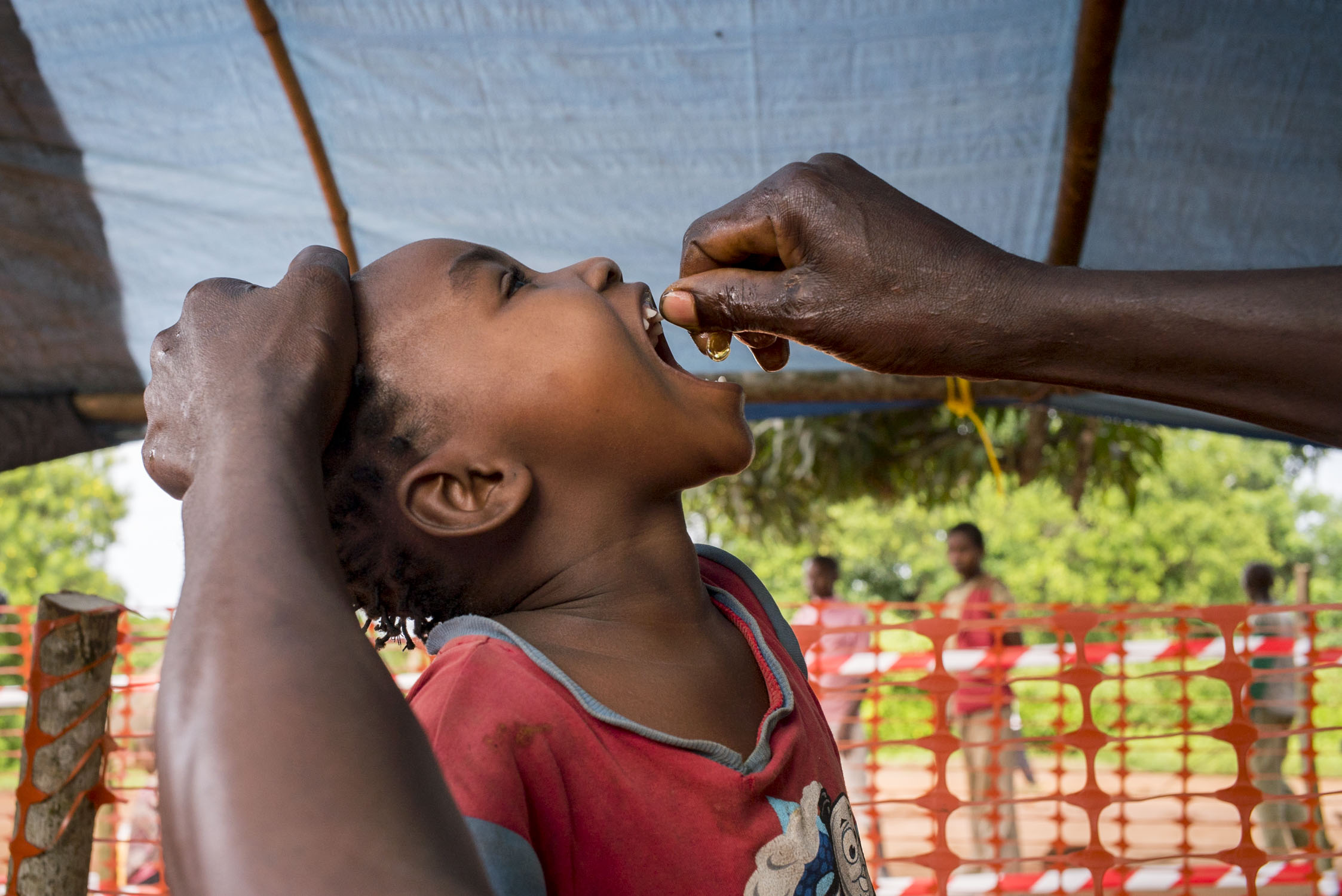
A young girl receives medicine during a 5-day measles vaccination campaign carried out by MSF in a region of Bas-Uele province of Democratic Republic of the Congo (DRC). MSF named measles among the top five epidemics that could erupt or worsen in 2016. DRC has the 5th highest under-five mortality rate in the world. An estimated 465,000 children in DRC die each year of preventable diseases. Monga, Bas-Uele province, Democratic Republic of the Congo. June 1, 2016
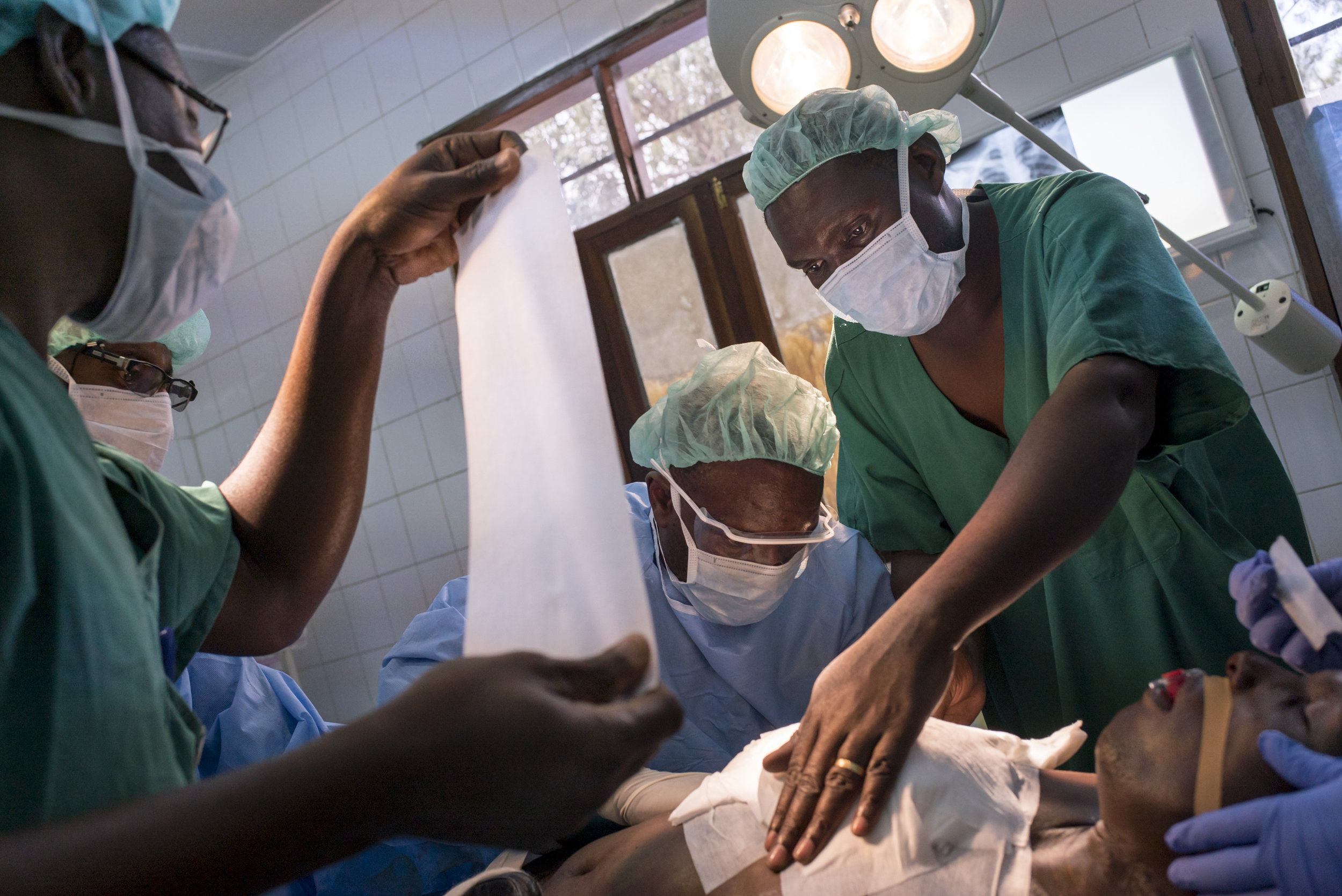
ICRC staff bandage Patrick Gasana Wabazazo, 44, after he received emergency surgery at Ndosho hospital in Goma. Patrick was shot in the chest when he was caught in a crossfire between armed men on his farmland, one hour from his home village of Nyanzale, in Rutshuru territory. "I had just arrived to my field, when I saw an armed man who had already kidnapped one of the villagers. I saw another group arrive, and the gunshots began." Other villagers later found Patrick lying in his field. The bodies of two unknown men that had been shot dead in the gun battle lay nearby. The villagers realized Patrick was still breathing, so they took him to the village health center. The following day, UN soldiers med evacuated Patrick by helicopter to an ICRC hospital in Goma, where he was immediately taken into emergency surgery. Ndosho Hospital, Goma, North Kivu, Democratic Republic of Congo. August 30, 2017.
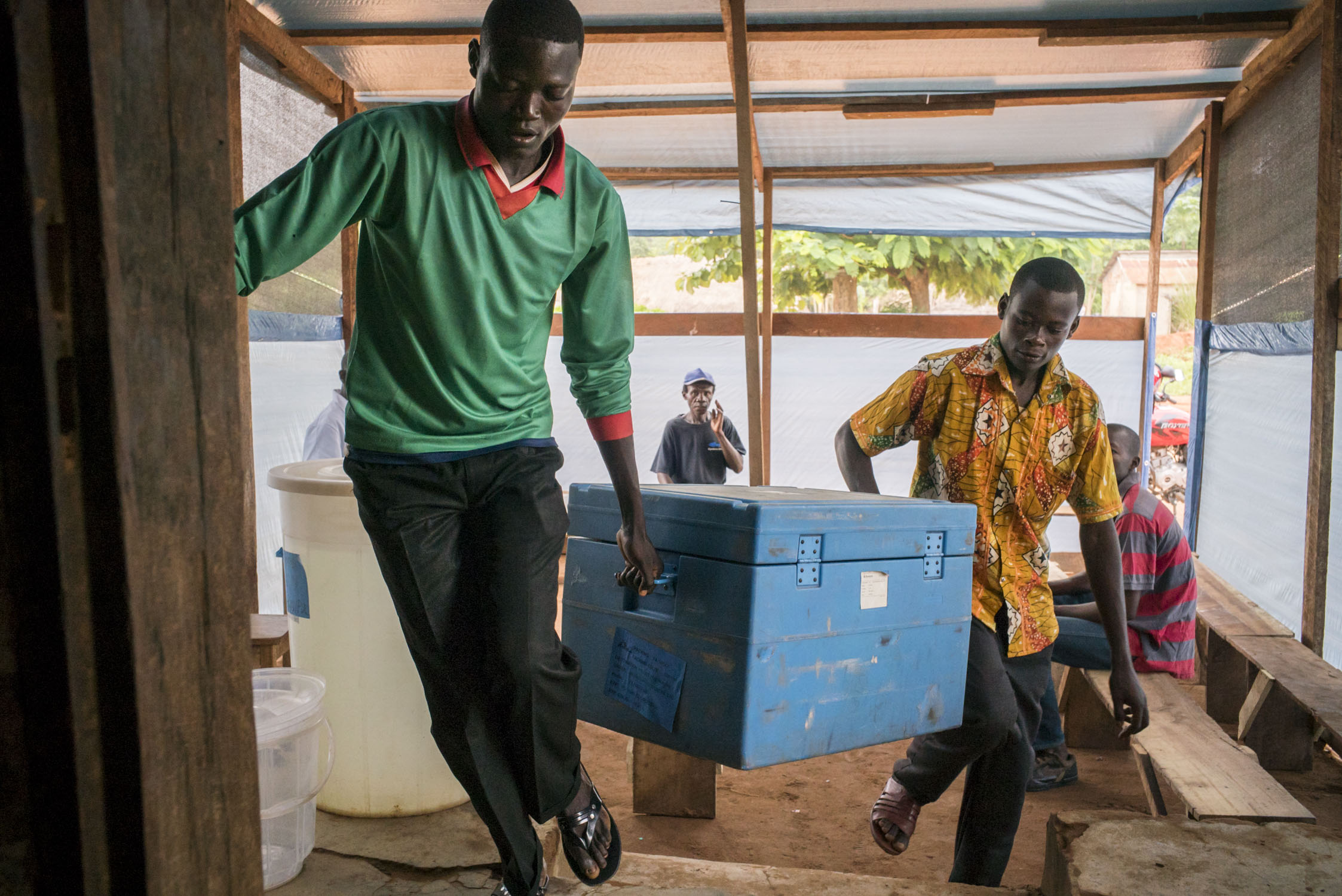
Local health workers carry in a cooler with vaccines into a health center in Monga, a town in a remote region of northern Democratic Republic of the Congo (DRC). The vaccines are to be administered the following day, as part of a 5-day measles vaccination campaign run by MSF. MSF named measles among the top five epidemics that could erupt or worsen in 2016. DRC has the 5th highest under-five mortality rate in the world. An estimated 465,000 children in DRC die each year of preventable diseases. Monga, Bas-Uele province, Democratic Republic of the Congo. May 31, 2016
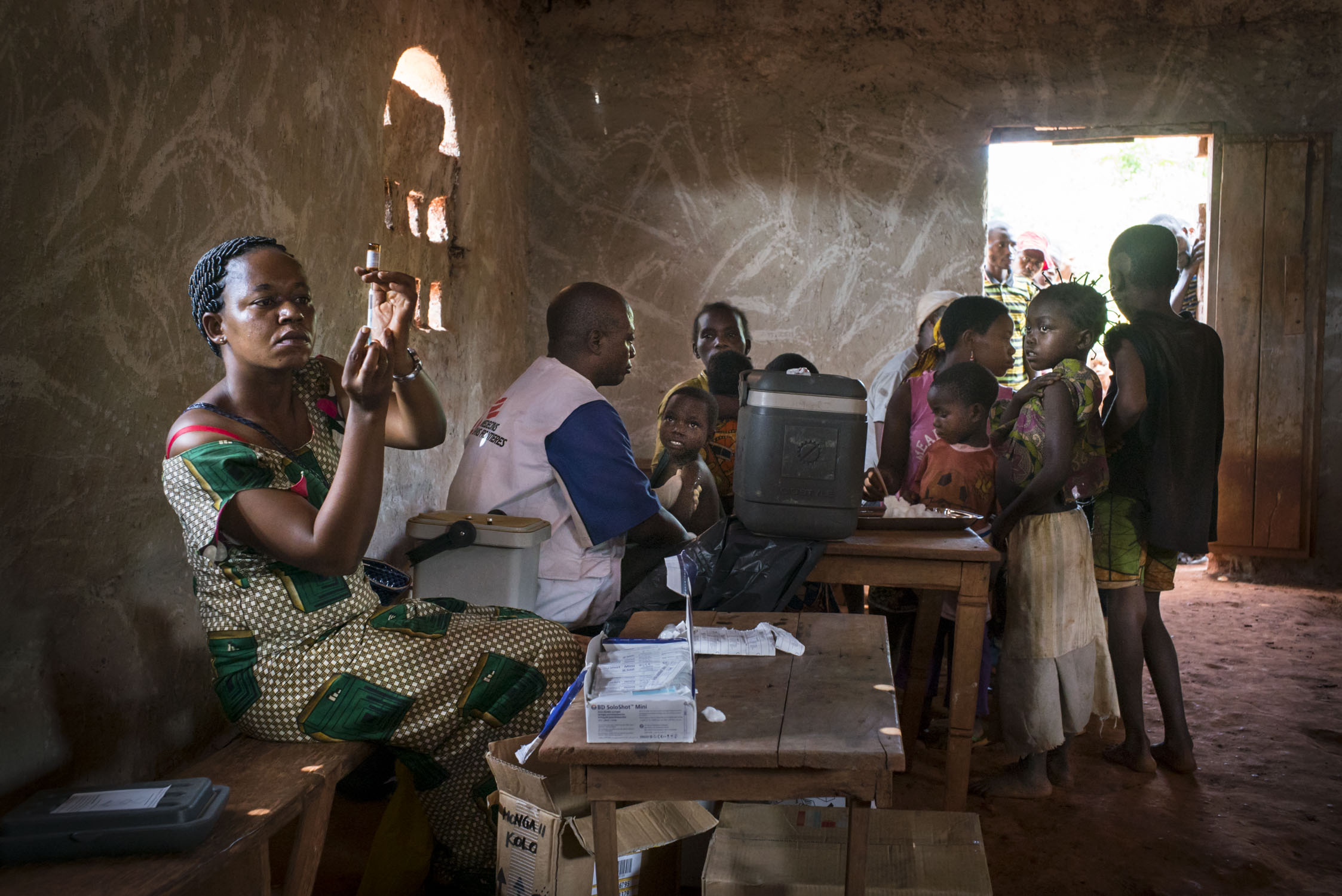
Children wait to be vaccinated during a five-day measles vaccination campaign run by MSF in a remote region of northern Democratic Republic of the Congo (DRC). MSF named measles among the top five epidemics that could erupt or worsen in 2016. DRC has the 5th highest under-five mortality rate in the world. An estimated 465,000 children in DRC die each year of preventable diseases. Kolo, Bas-Uele province, Democratic Republic of the Congo. June 1, 2016
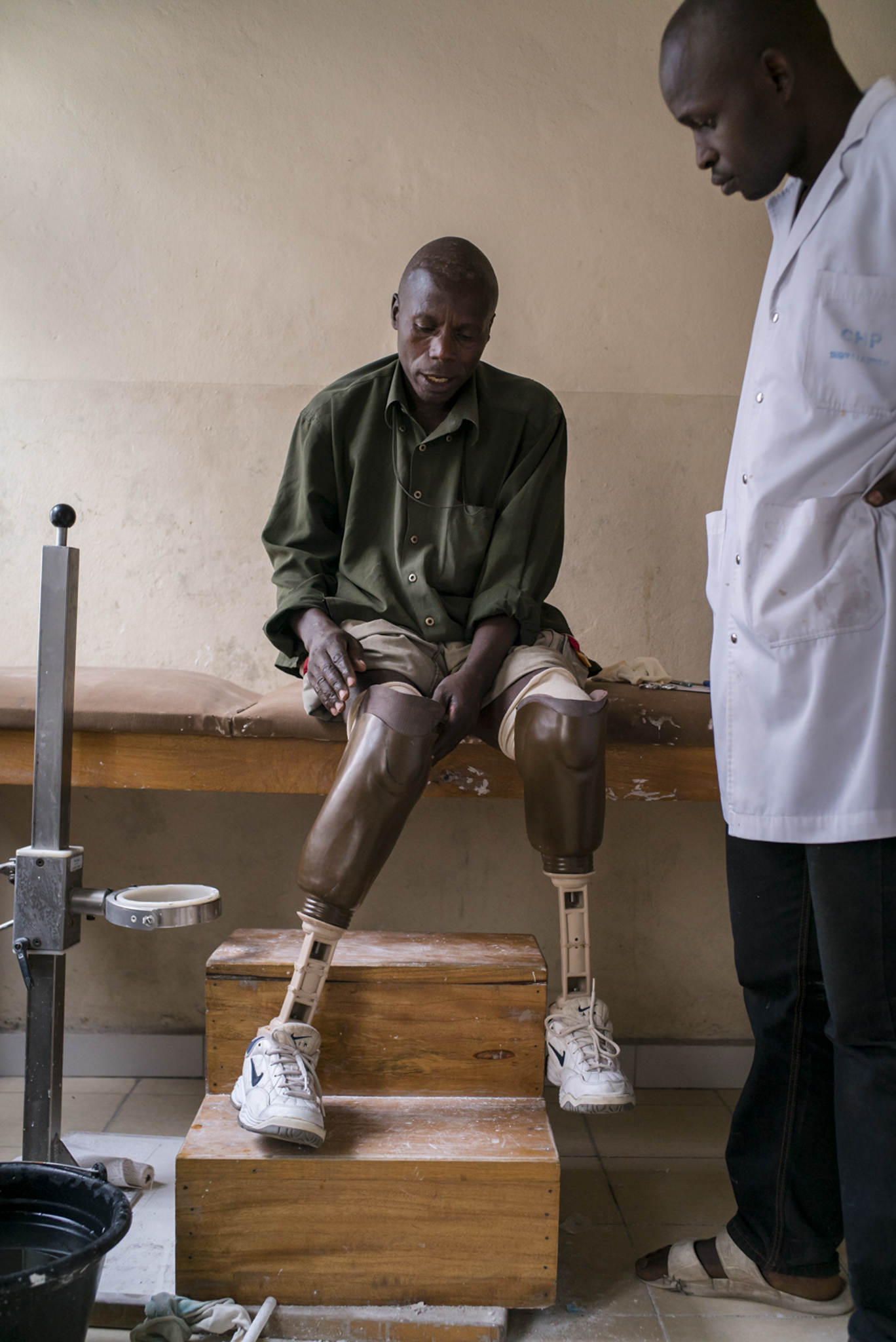
Augustin Semayinga Rukara, 51, a double amputee and father of eight, he puts on his prosthetic limb at a doctor's office. Augustin’s village of Mpati, in Masisi territory of North Kivu, was attacked in June 2013 and he lost his right leg after he was hit by a bullet. In October of that year he received his first prosthesis from the ICRC. In March 2016, his village was attacked again, and this time fighters shot Augustin in the left leg as he fled for his life. In July 2017, Augustin's second leg had to be amputated. With a second prothetic leg from the ICRC, he was able to walk again. Centre pour Handicapes Physiques Shrika La Umoja, Goma, North Kivu, Democratic Republic of Congo. August 30, 2017.
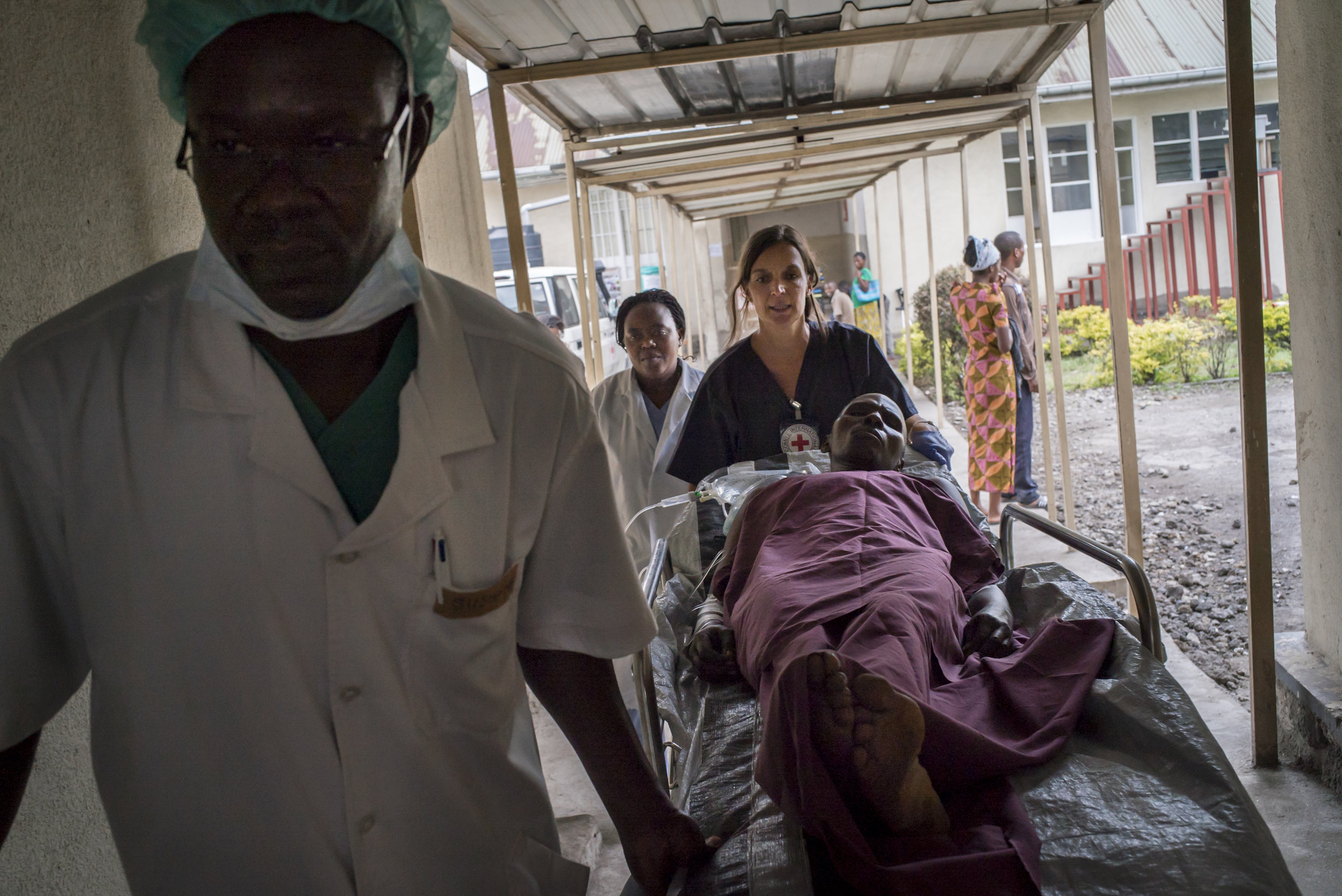
Patrick Gasana Wabazazo, 44, is rushed into an emergency surgery at Ndosho hospital in Goma, Congo. Patrick was shot in the chest when he was caught in a crossfire between armed men on his farmland, one hour from his home village of Nyanzale, in Rutshuru territory of North Kivu. "I had just arrived to my field, when I saw an armed man who had already kidnapped one of the villagers. I saw another group arrive, and the gunshots began." Other villagers later found Patrick lying in his field. The bodies of two unknown men that had been shot dead in the gun battle lay nearby. The villagers realized Patrick was still breathing, so they took him to the village health center. The following day, UN soldiers med evacuated Patrick by helicopter to Goma, where he could receive emergency medical attention from the ICRC. Ndosho Hospital, Goma, North Kivu, Democratic Republic of Congo. August 30, 2017.
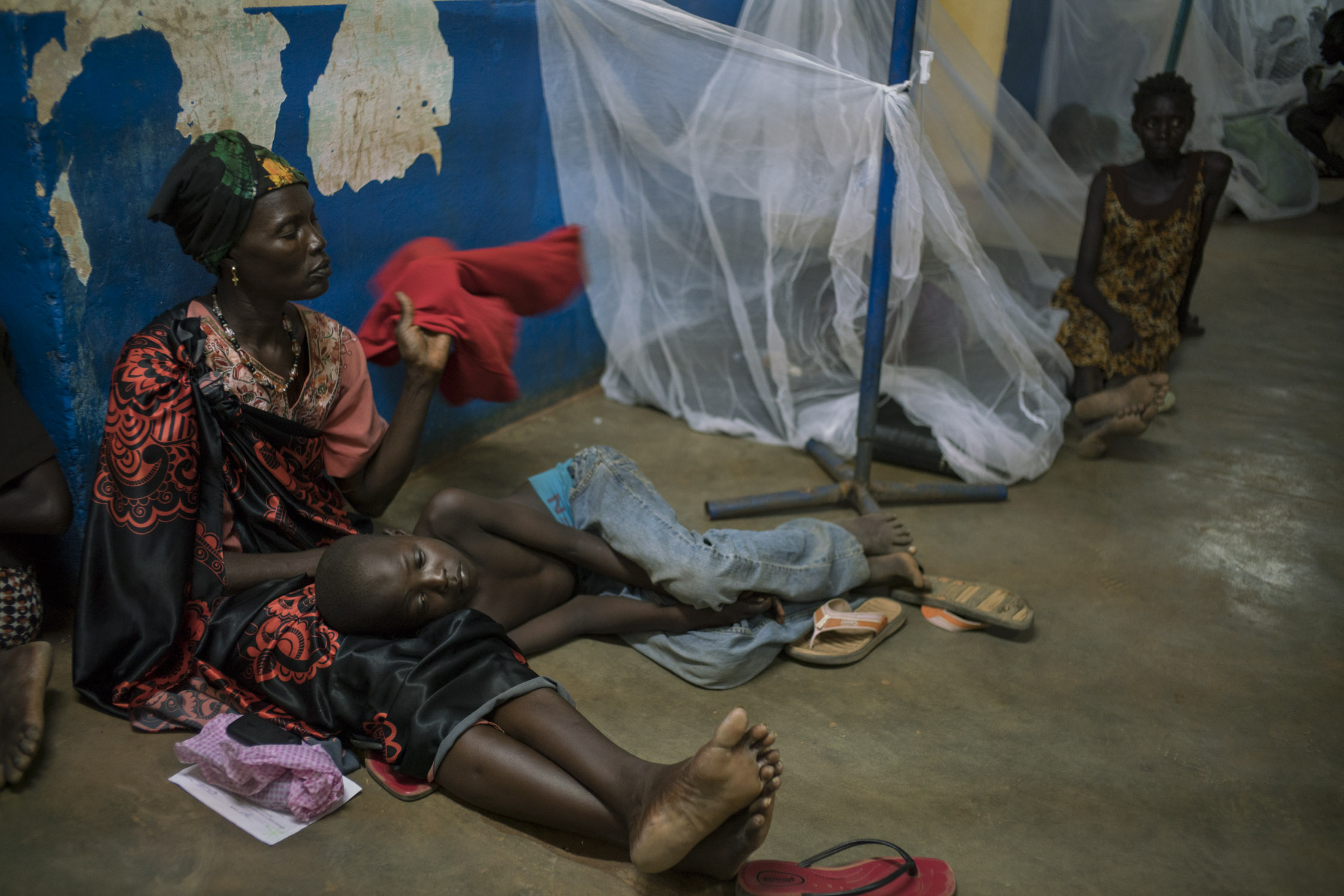
A woman fans her feverish son, and waits for him to be admitted into the MSF-run portion of the hospital in Aweil, the only hospital serving the 1.2 million living in Northern Bahr el Ghazal, South Sudan's poorest state. An overflow of malaria patients left the hospital with no available beds in the wards, so patients lie in the hallways, on mattresses dressed with mosquito nets. South Sudan is host to one of the deadliest conflicts in the world, yet in 2015, malaria killed more people than bullets. Across the country, 2.28 million cases of malaria were reported. The lack of nearby health care facilities and drug shortages were particularly apparent in Northern Bahr el Ghazal. Many traveled hours or days, arriving to a medical facility with either cerebral malaria, a condition in which the brain is affected, or already dead. Aweil, Northern Bahr el Ghazal, South Sudan. October 15, 2015
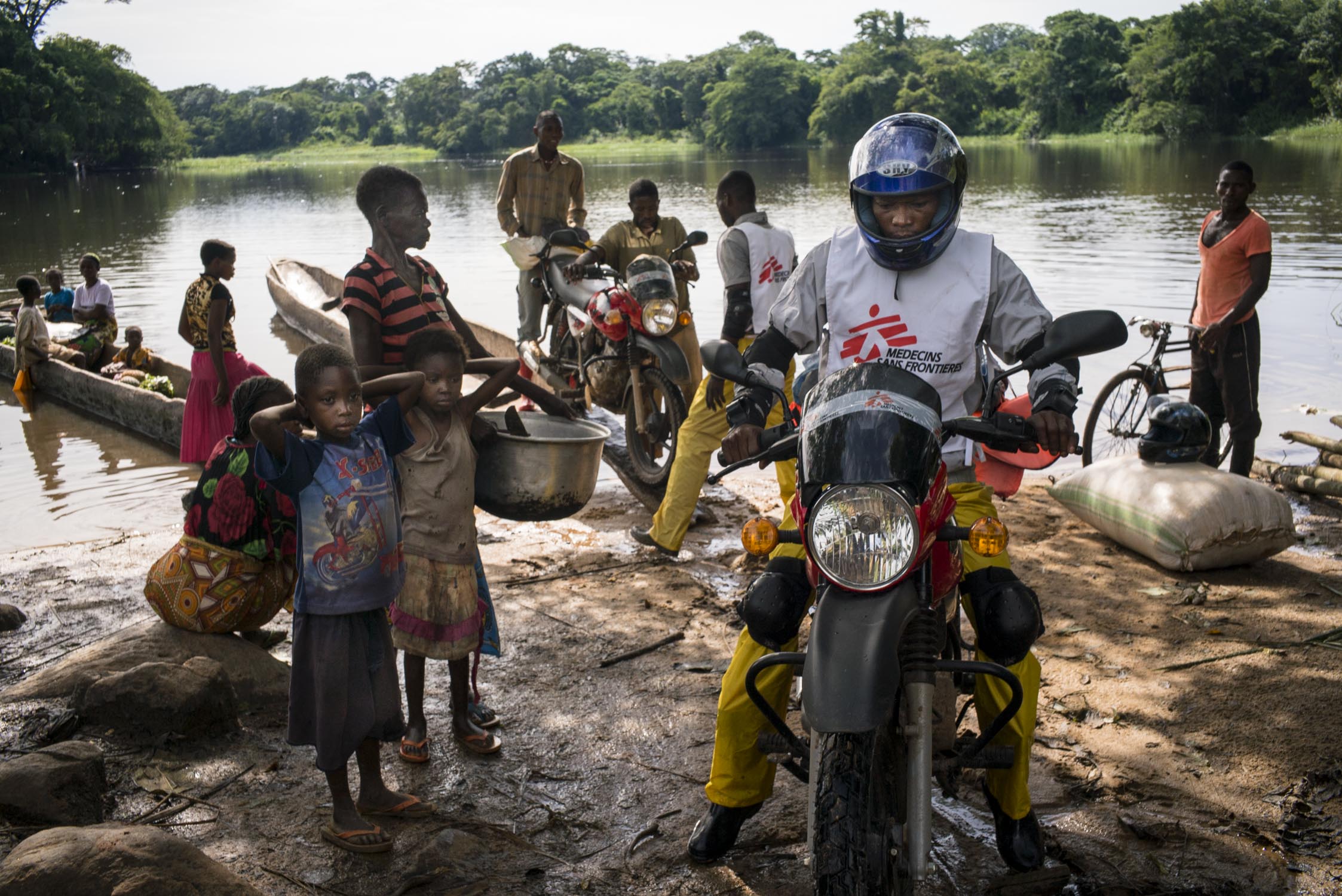
MSF drivers disembark their motorcycles from the local pirogues (traditional canoes) used to cross a river on their journey to a health center in Sombe, a village in the remote Bas-Uele province of Democratic Republic of the Congo (DRC). MSF arrived to the area to carry out a five-day measles vaccination campaign in response to a measles epidemic. MSF had named measles among the top five epidemics that could erupt or worsen in 2016. DRC has the fifth highest under-five mortality rate in the world. An estimated 465,000 children in DRC die each year of preventable diseases. Bas-Uele province, Democratic Republic of the Congo. May 28, 2016
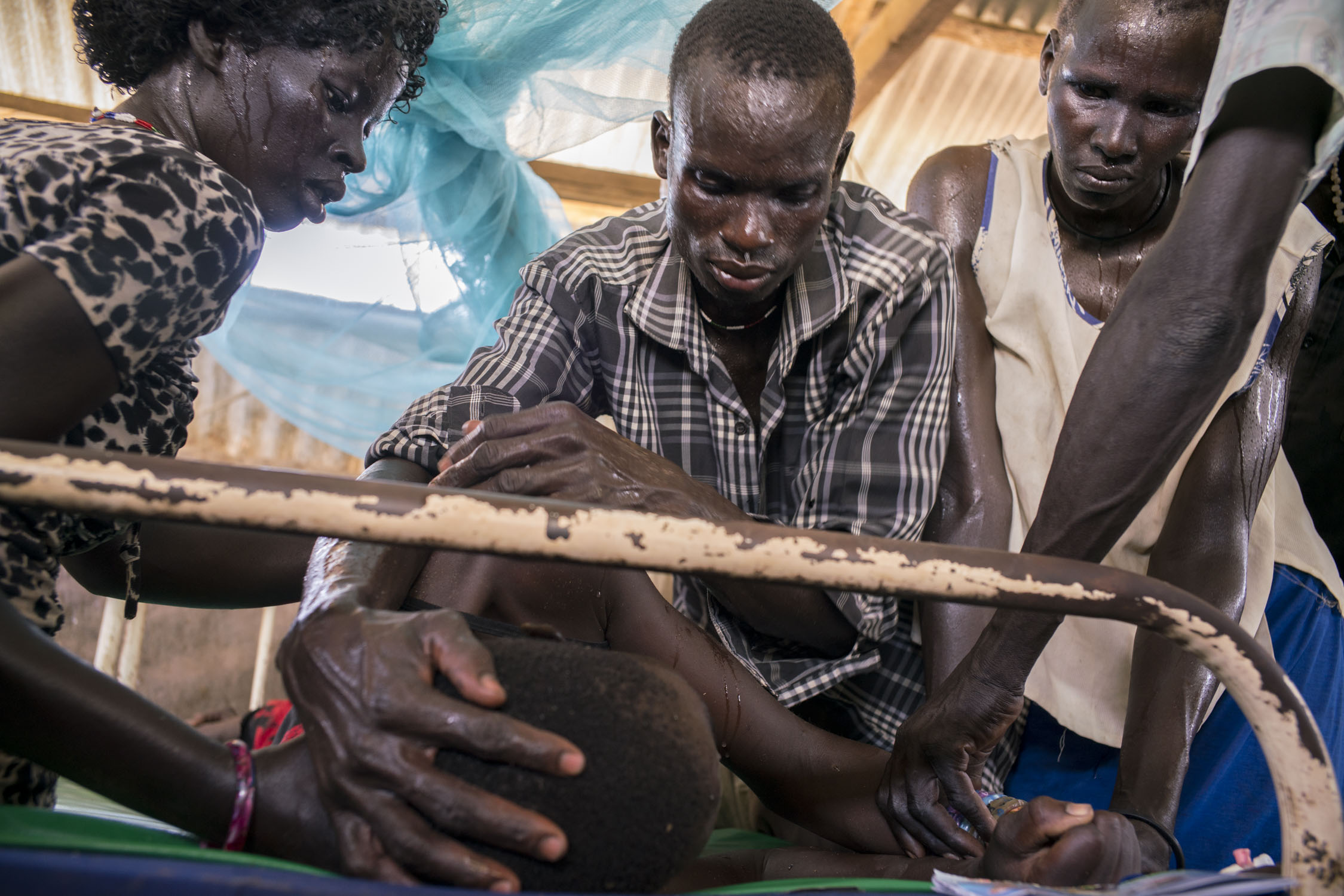
The family of eighteen year-old Abuk Akuoc, semi-conscious and letting out cries of pain, holds her still in preparation for an IV of quinine, life-saving medication for malaria, at a health care center in Panthou, a remote village in Northern Bahr el Ghazal, the poorest state in South Sudan. The country is host to one of the deadliest conflicts in the world, yet in 2015, malaria killed more people than bullets. Across the country, 2.28 million cases of malaria were reported. The lack of accessible health care facilities and drug shortages were particularly apparent in Northern Bahr el Ghazal. Many traveled hours or days and arrived to a medical facility too late, now suffering from cerebral malaria, an advanced condition in which the brain is affected, or already dead. Panthou village, Aweil South county, Northern Bahr el Ghazal, South Sudan. October 14, 2015
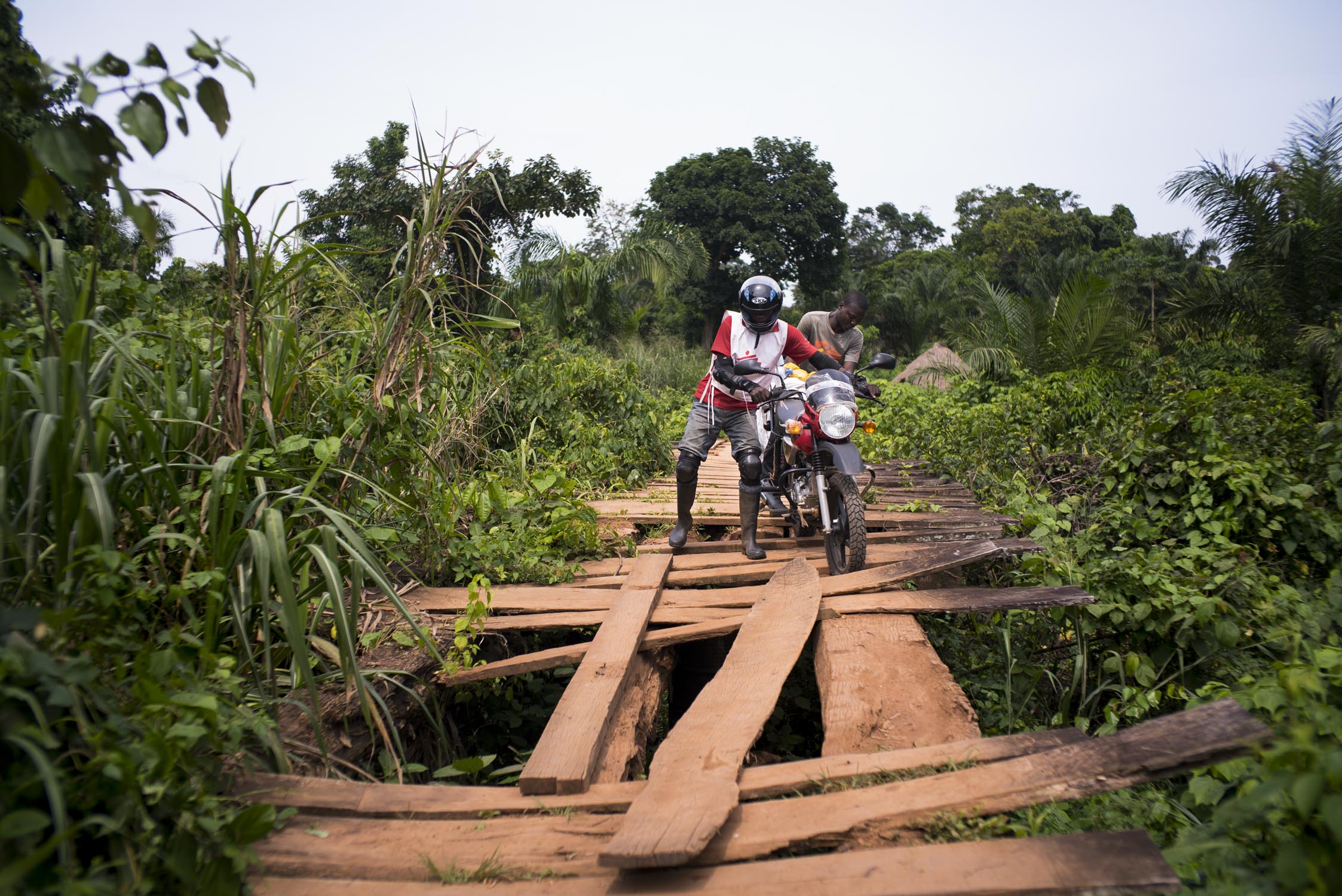
A MSF driver struggles to push his motorbike over a bridge on the route to the health center in the village of Nzeret, the epicenter of a measles epidemic that spread through this remote northern area of Democratic Republic of the Congo (DRC) in early 2016. The bridge had been in even worse shape until MSF purchased additional wooden planks and hired a crew of local workers to fortify it earlier that day, a necessary measure in order to carry out their planned 5-day measles vaccination campaign. MSF had named measles among the top five epidemics that could erupt or worsen in 2016. DRC has the fifth highest under-five mortality rate in the world. An estimated 465,000 children in DRC die each year of preventable diseases. Nzeret, Bas-Uele province, Democratic Republic of the Congo. May 27, 2016
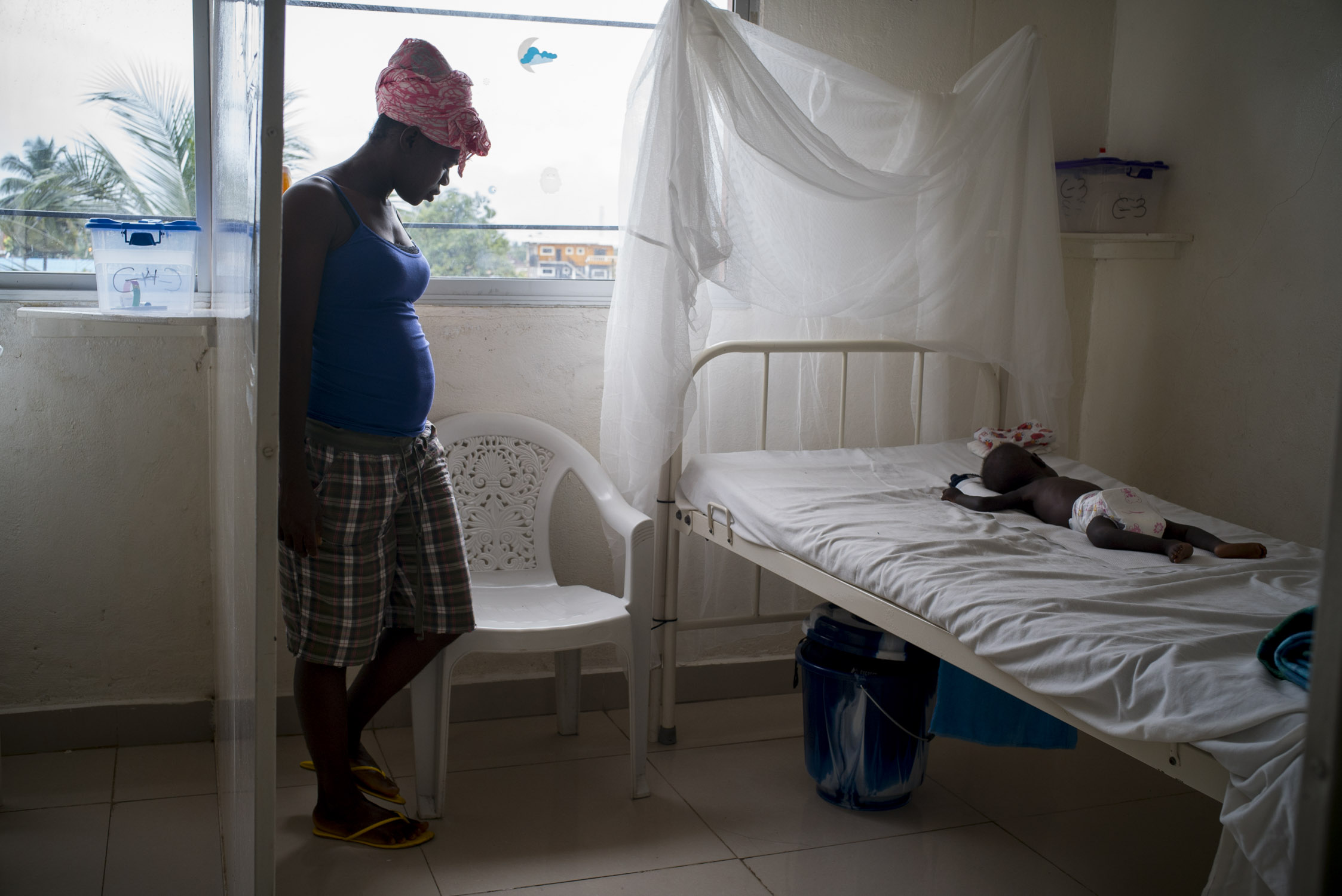
A mother stands bedside as her infants sleeps in the malnutrition ward of the MSF Hospital in Monrovia, Liberia. Sept. 27, 2016
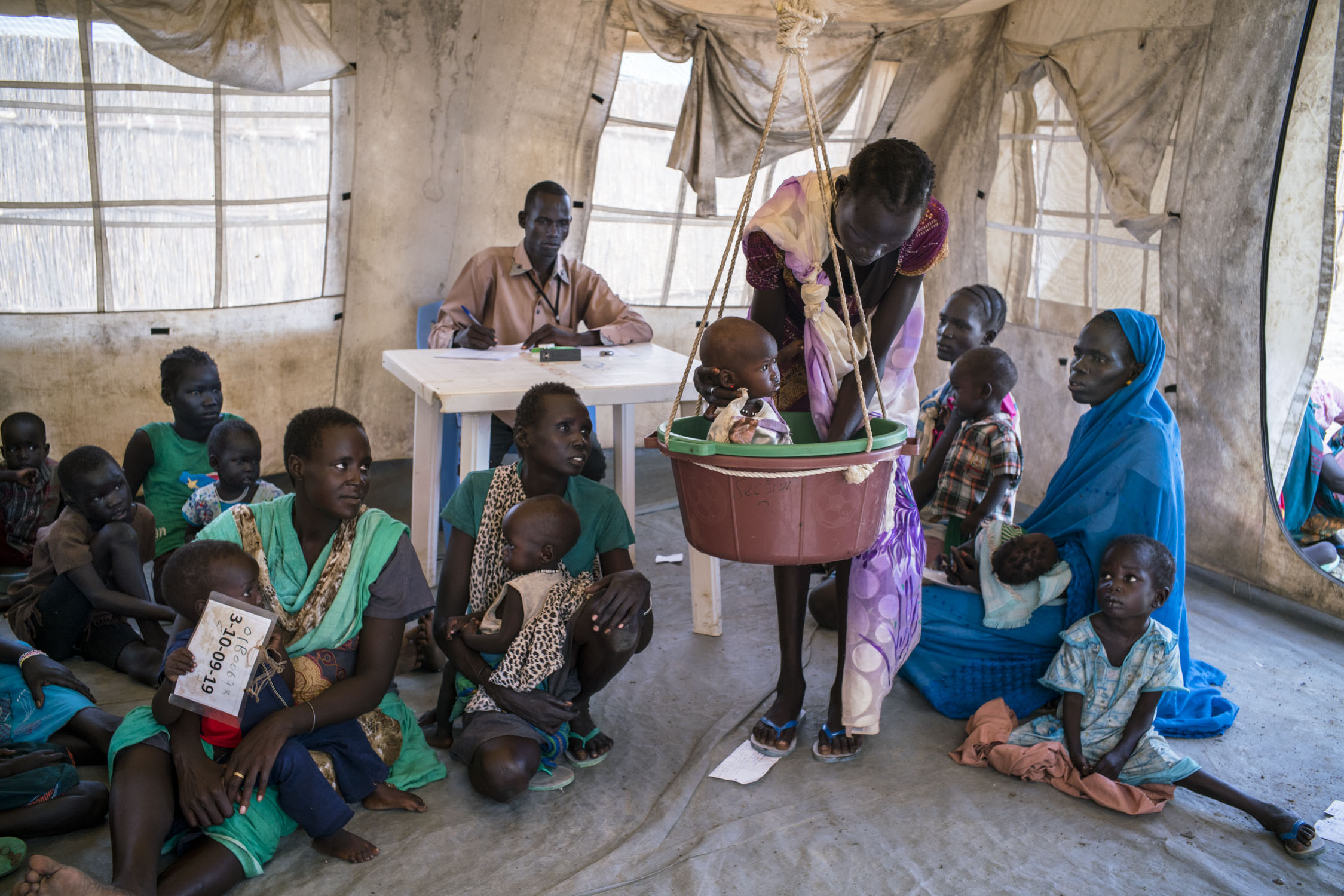
A child's weight is recorded at one of the clinics run by Medicins Sans Frontieres in the Protection of Civilians (PoC) camp in Bentiu, South Sudan. Weight and MUAC (mid-upper-arm circumference) is taken for the purpose of diagnosing malnutrition. The camp has a population of over 120,000 people who have fled their homes due to the country's civil war. This figure made it the second largest city in South Sudan. Bentiu PoC, South Sudan. October 2015
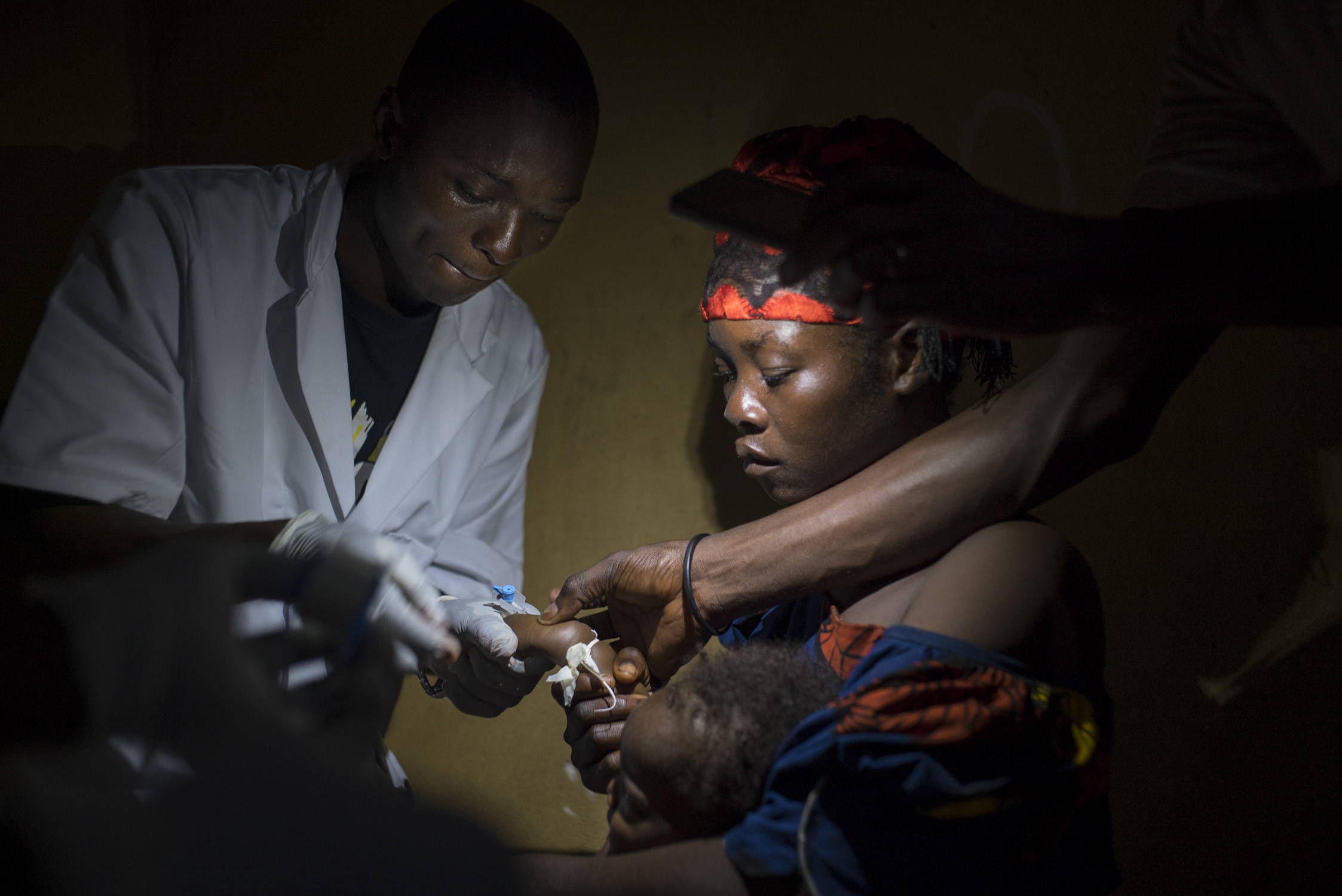
Late in the night, Nurse Dieumerci Ngame administers a blood transfusion to five-month old Adji Yanzambe, who receives treatment for anemia and malaria in the MSF wing of the hospital in Monga, a town in a remote northern part of the Democratic Republic of the Congo (DRC). Another worker holds out his cell phone to provide light. The DRC has the fifth highest infant mortality rate in the world. Monga, Bas-Uele province, Democratic Republic of the Congo. May 26, 2016
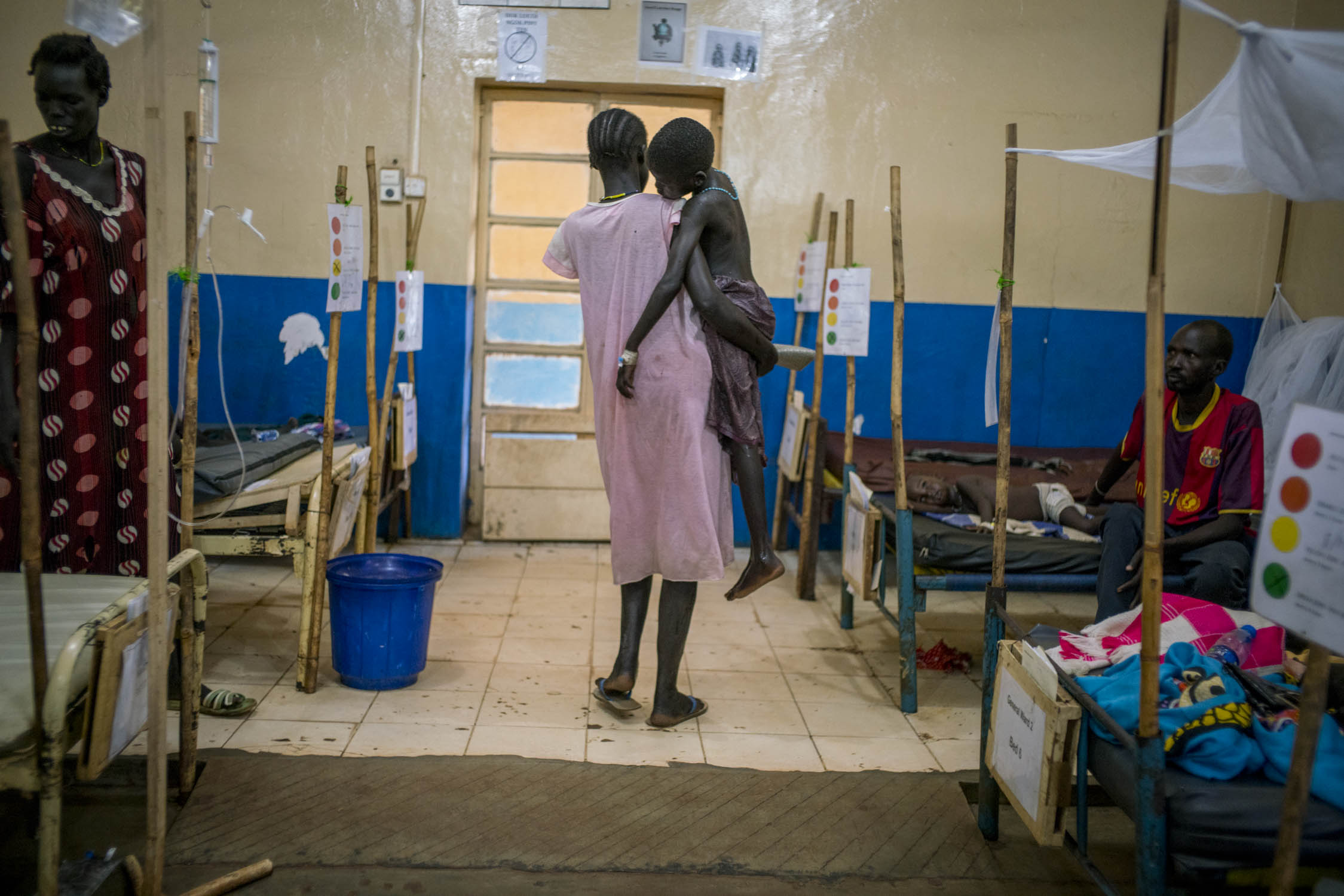
Aweng Diing Geng, 5, is carried back to her bed by her mother, who has just finished bathing her in the yard of the MSF hospital in Aweil, the main city in South Sudan's poorest state, Northern Bahr el Ghazal. Aweng is receiving treatment for severe cerebral malaria, an advanced stage in which the brain is affected. South Sudan is host to one of the deadliest conflicts in the world, yet in 2015, malaria killed more people than bullets. Across the country, 2.28 million cases of malaria were reported. The lack of nearby health care facilities and drug shortages were particularly apparent in Northern Bahr el Ghazal, where a population of 1.2 million had only one full hospital at their service. Many were forced many to travel for hours or days in search of care. By the time they reached medical help, it was often too late. Many were diagnosed with cerebral malaria or even pronounced dead on arrival. Aweil, Northern Bahr el Ghazal, South Sudan. October 15, 2015
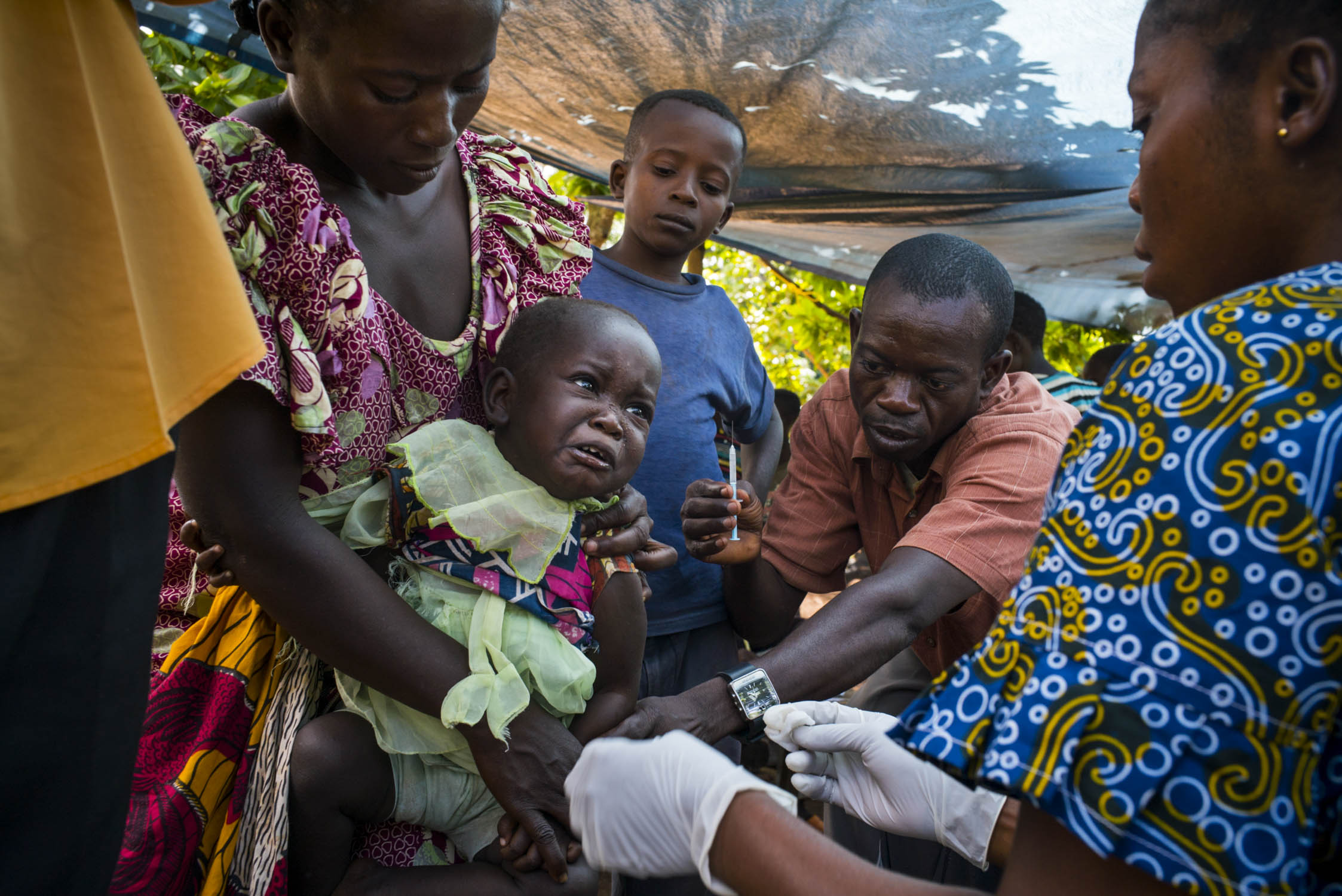
A child is vaccinated during a five-day measles vaccination campaign run by MSF in a remote region of northern Democratic Republic of the Congo (DRC). MSF named measles among the top five epidemics that could erupt or worsen in 2016. DRC has the fifth highest under-five mortality rate in the world. An estimated 465,000 children in DRC die each year of preventable diseases. Bas-Uele province, Democratic Republic of the Congo. June 1, 2016
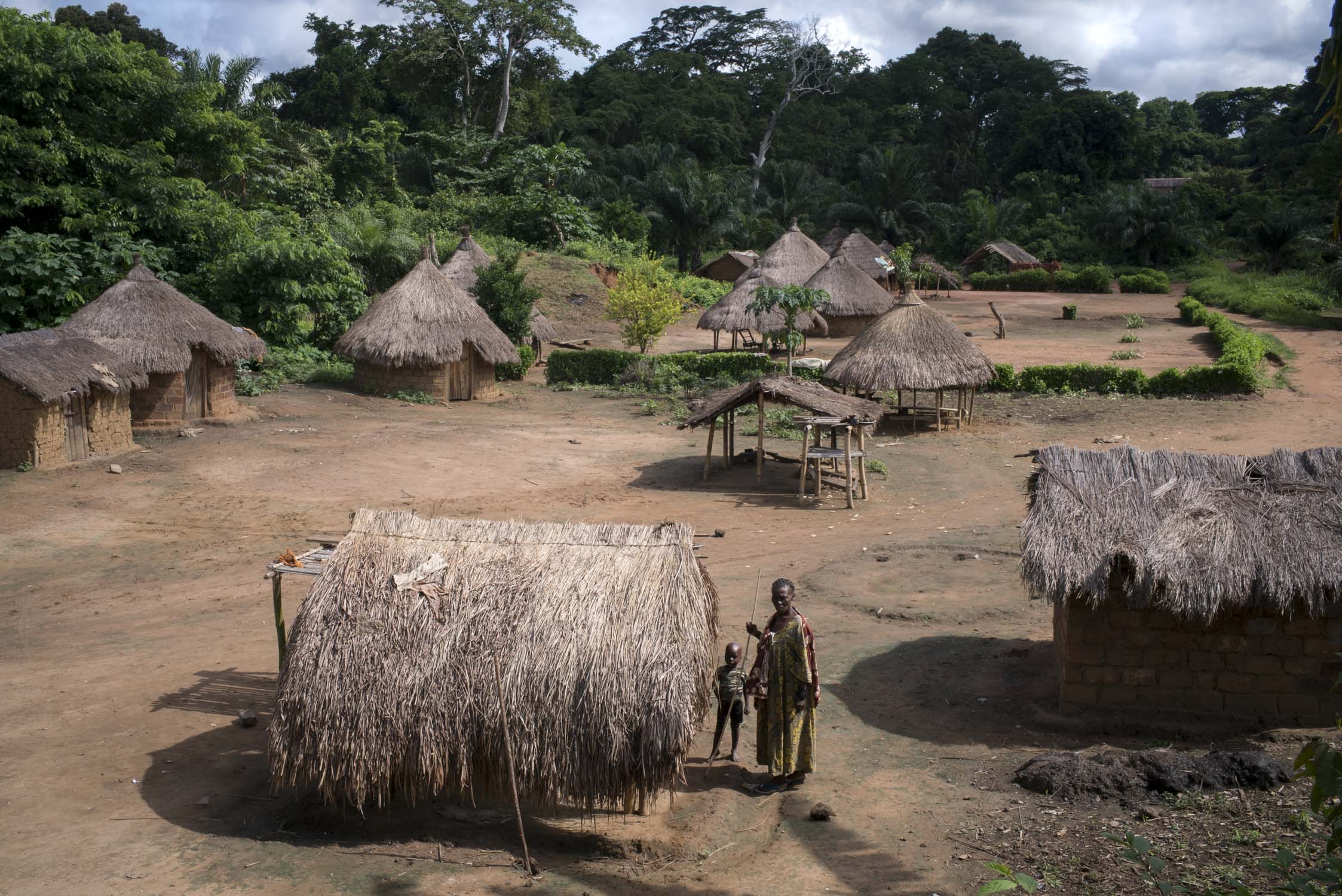
A woman and child stand outside their home in the village of Nzeret, the epicenter of a measles epidemic that spread through this remote area of northern Democratic Republic of the Congo (DRC) in early 2016. In response, MSF carried out a 5-day measles vaccination campaign. MSF had named measles among the top five epidemics that could erupt or worsen in 2016. DRC has the fifth highest under-five mortality rate in the world, with an estimated 465,000 children losing their life to preventable diseases every year. Nzeret, Bas-Uele province, Democratic Republic of the Congo. May 27, 2016
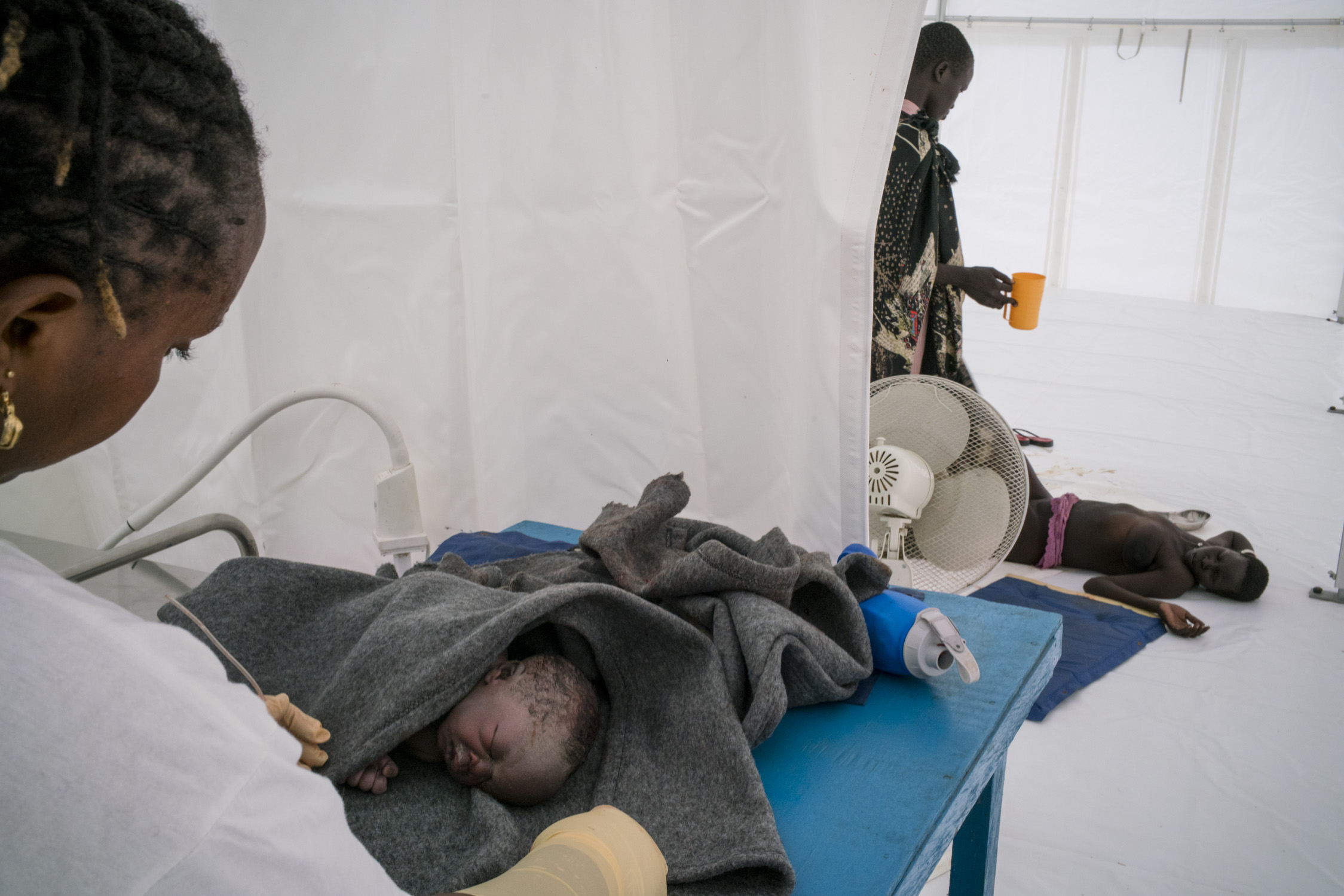
A midwife tends to a newborn who is not breathing or suckling as normally expected, suggesting birth defects, while his mother lies collapsed on the floor of the MSF hospital tent after an extremely difficult delivery. After six children, giving birth becomes high risk, and this is her eighth child. South Sudan has the highest maternal mortality rate in the world, in part due to the lack for health care facilities coupled with one of the highest fertility rates in the world. This MSF hospital served people displaced by the country's civil war and living in the Protection of Civilians (PoC) camp in Bentiu. The camp at Bentiu had a population of over 120,000, making it the second largest city in South Sudan. Bentiu PoC camp, South Sudan. October, 2015
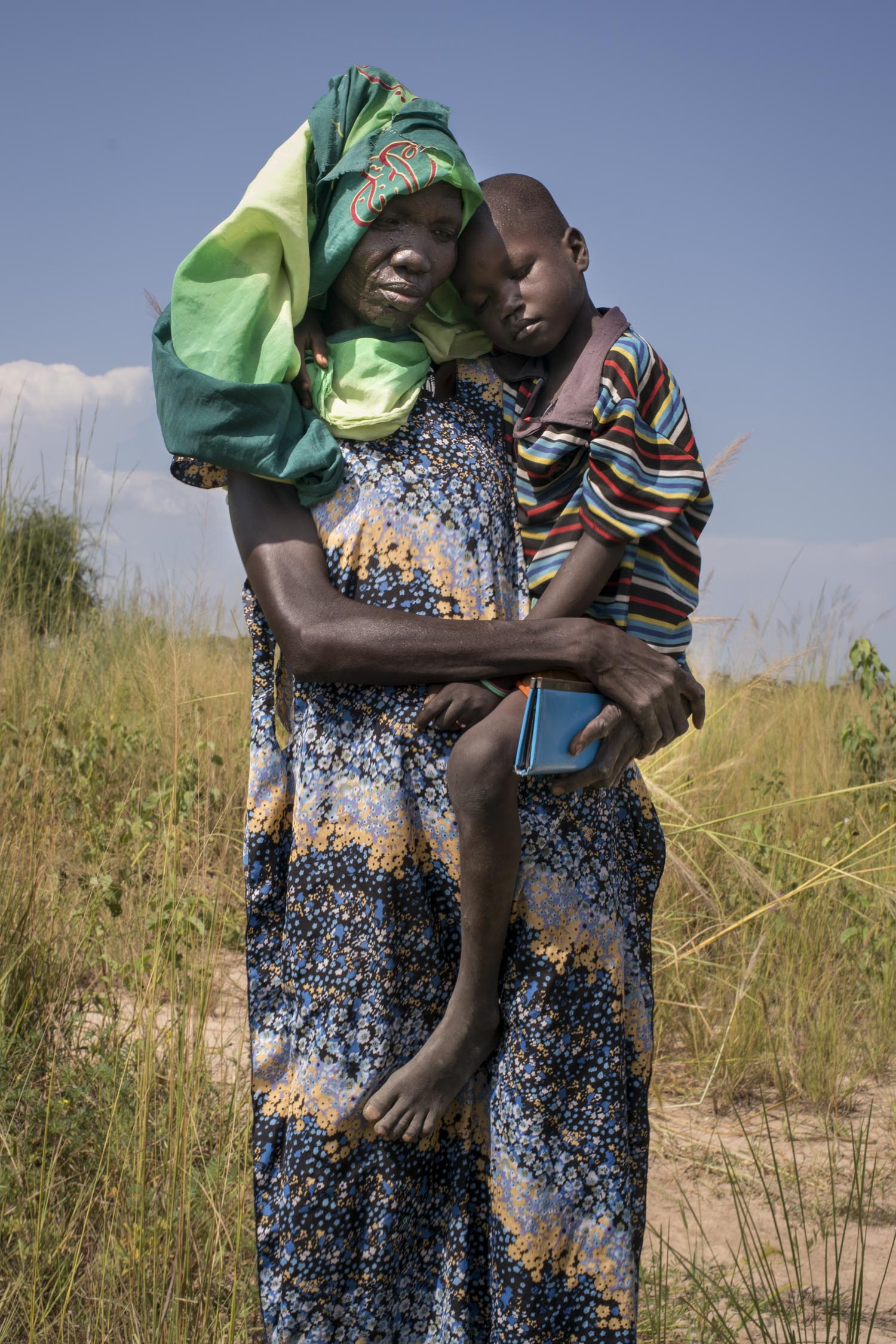
Akuot Yel carries her sick four year old son, Agok, to a private clinic in a neighboring town in hopes for finding medical care for him. Yesterday, she took him to a government-run clinic nearby but found nobody there. Like Agok, most of the local ill are suffering from malaria. Having no trained personnel to administer quinine intravenously, and often no oral medication in stock, the clinics stay closed, thinking that there is no service they can provide. The private clinic Akuot will now visit charges 15 SSP (1 USD) for the Rapid Detection Test (RDT), and 80 SSP (5.30 USD) for the medicine needed. Akuot has two twins at home who are also ill, but Agok's state was most serious. She can't afford medication for all of three sick children, so she will try to take care of Agok first. At home, they use a mosquito net that they received from an NGO who distributed them in the area two years ago, but it is old now and tearing.
South Sudan is host to one of the deadliest conflicts in the world, yet in 2015, malaria killed more people than bullets. Across the country, 2.28 million cases of malaria were reported. The lack of accessible health care facilities and drug shortages were particularly apparent in Northern Bahr el Ghazal, the country's poorest state. Many traveled hours or days and arrived to a medical facility too late, now suffering from cerebral malaria, an advanced condition in which the brain is affected, or already dead. Maluil, Northern Bahr el Ghazal, South Sudan. October 14, 2015




























Arek Nuoi, 32, is carried unconscious by her three brother-in-laws to a ward at a government-run health care center, where she will receive urgent treatment for acute malaria. Her brother-in-laws transported Arek from their home village by placing her in a chair that they tied on top of a bicycle, and pushing the bicycle for one and a half hours to reach the health care center. South Sudan is host to one of the deadliest conflicts in the world, yet in 2015, malaria killed more people than bullets. Across the country, 2.28 million cases of malaria were reported. Panthou, Northern Bahr el Ghazal, South Sudan. October 14, 2015
A nurse checks blood-type compatibility before administering a blood transfusion to Adut Chuor Kujal, 8, who is receiving treatment for cerebral malaria at an MSF hospital in Aweil city, South Sudan. Adut's father presses down on her fingertip that has just been pricked to obtain a blood sample. Adut's family lives in a remote rural village so she had been sick for several days before her father made the journey to Aweil. He had first taken her to a private clinic closer to their home but they had no malaria drugs in stock. South Sudan is host to one of the deadliest conflicts in the world, yet in 2015, malaria killed more people than bullets. Across the country, 2.28 million cases of malaria were reported. Aweil, Northern Bahr el Ghazar state, South Sudan. October 15, 2015
Mothers hold their sick children in the crowded waiting room of the MSF wing at a hospital in Monga, a town in a remote northern region of Democratic Republic of the Congo. MSF arrived to the area in response to a measles epidemic, therefore, only children with a fever were referred to the MSF wing. Monga, Bas-Uele province, Democratic Republic of the Congo. May 26, 2016
Patients wait to receive medicine at a health care center in Panthou village. Located in a remote rural area, the center was the only place in Aweil South county where patients might be able to receive free treatment and medicine for malaria. Only two staffs - both medical assistants - at the health care center are qualified to diagnose and treat patients. They treated approximately 150 malaria patients per day. The center had just received a supply of ACT oral medication for malaria, which had been out of stock for two months. The new supply was predicted to last one or two weeks. The only other medication in stock was quinine, but there was so little left that it was reserved for serious cases only. The center had no RDTs (rapid detection tests), so diagnosis was only done clinically based on symptoms observed. South Sudan is host to one of the deadliest conflicts in the world, yet in 2015, malaria killed more people than bullets. Across the country, 2.28 million cases of malaria were reported. Panthou village, Northern Bahr el Ghazal state, South Sudan. October 14, 2015
A sanitation worker walks though the back courtyard of an MSF hospital in Monrovia, Liberia. In the aftermath of the the ebola epidemic of 2014/15 that left an estimated 4800 dead in Liberia, the hospital adheres to especially strict routine sanitation measures. Monrovia, Liberia. Sept. 28, 2016
Madeleine Ngimambi, sits with her 7-month old daughter, Madeleine Pemu, who is receiving treatment for malnutrition in the MSF wing of the hospital in Monga, a town in a remote region of northern Democratic Republic of the Congo (DRC). Madeleine arrived to the hospital with both her daughter and son, after traveling 20 km on foot from their village, Faka. MSF was present at the hospital with the primary purpose of responding to an existing measles epidemic; however, they found many of the children admitted to their wing suffered from malnutrition. Monga, Bas-Uele province, Democratic Republic of the Congo. May 26, 2016
After an extremely difficult labor, a woman delivers her eighth child on her knees, assisted by a midwife, Rebecca, and her four assistants in a MSF hospital tent in the internally displaced persons (IDPs) camp in Bentiu. South Sudan has the highest maternal mortality rate in the world, in part due to the lack for health care facilities coupled with one of the highest fertility rates in the world -- after six children, giving birth becomes high risk. Rebecca said she had never seen anyone deliver on her knees before, and that the infant was not breathing or suckling as a newborn should, suggesting possible birth defects. The camp at Bentiu had a population of over 120,000, making it the second largest city in South Sudan. Bentiu Protection of Civilians (PoC) camp, South Sudan. October, 2015
Alfred Walker, 52, Water and Sanitation Supervisor of an MSF hospital in Monrovia, Liberia, stands by the stairs leading to the incinerator, which is used for safe disposal of medical waste. In the aftermath of the the ebola epidemic of 2014/15 that left an estimated 4800 dead in Liberia, the hospital adheres to especially strict routine sanitation measures. Monrovia, Liberia. Sept. 28, 2016
Anne Muller, the head nurse of the surgical team at Ndosho hospital in Goma, DRC, prepares a patient for emergency surgery. The patient, Patrick Gasana Wabazazo, 44, was shot in the chest (thorax) when he was caught in a crossfire between armed men on his farmland, one hour from his home village of Nyanzale, in Rutshuru territory. "I had just arrived to my field, when I saw an armed man who had already kidnapped one of the villagers. I saw another group arrive, and the gunshots began." Other villagers later found Patrick lying in his field. The bodies of two unknown men that had been shot dead in the gun battle lay nearby. The villagers realized Patrick was still breathing, so they took him to the village health center. The following day, UN soldiers med evacuated Patrick by helicopter to an ICRC hospital in Goma, where he was immediately taken into emergency surgery. Ndosho Hospital, Goma, Democratic Republic of Congo. August 30, 2017.
A young girl receives medicine during a 5-day measles vaccination campaign carried out by MSF in a region of Bas-Uele province of Democratic Republic of the Congo (DRC). MSF named measles among the top five epidemics that could erupt or worsen in 2016. DRC has the 5th highest under-five mortality rate in the world. An estimated 465,000 children in DRC die each year of preventable diseases. Monga, Bas-Uele province, Democratic Republic of the Congo. June 1, 2016
ICRC staff bandage Patrick Gasana Wabazazo, 44, after he received emergency surgery at Ndosho hospital in Goma. Patrick was shot in the chest when he was caught in a crossfire between armed men on his farmland, one hour from his home village of Nyanzale, in Rutshuru territory. "I had just arrived to my field, when I saw an armed man who had already kidnapped one of the villagers. I saw another group arrive, and the gunshots began." Other villagers later found Patrick lying in his field. The bodies of two unknown men that had been shot dead in the gun battle lay nearby. The villagers realized Patrick was still breathing, so they took him to the village health center. The following day, UN soldiers med evacuated Patrick by helicopter to an ICRC hospital in Goma, where he was immediately taken into emergency surgery. Ndosho Hospital, Goma, North Kivu, Democratic Republic of Congo. August 30, 2017.
Local health workers carry in a cooler with vaccines into a health center in Monga, a town in a remote region of northern Democratic Republic of the Congo (DRC). The vaccines are to be administered the following day, as part of a 5-day measles vaccination campaign run by MSF. MSF named measles among the top five epidemics that could erupt or worsen in 2016. DRC has the 5th highest under-five mortality rate in the world. An estimated 465,000 children in DRC die each year of preventable diseases. Monga, Bas-Uele province, Democratic Republic of the Congo. May 31, 2016
Children wait to be vaccinated during a five-day measles vaccination campaign run by MSF in a remote region of northern Democratic Republic of the Congo (DRC). MSF named measles among the top five epidemics that could erupt or worsen in 2016. DRC has the 5th highest under-five mortality rate in the world. An estimated 465,000 children in DRC die each year of preventable diseases. Kolo, Bas-Uele province, Democratic Republic of the Congo. June 1, 2016
Augustin Semayinga Rukara, 51, a double amputee and father of eight, he puts on his prosthetic limb at a doctor's office. Augustin’s village of Mpati, in Masisi territory of North Kivu, was attacked in June 2013 and he lost his right leg after he was hit by a bullet. In October of that year he received his first prosthesis from the ICRC. In March 2016, his village was attacked again, and this time fighters shot Augustin in the left leg as he fled for his life. In July 2017, Augustin's second leg had to be amputated. With a second prothetic leg from the ICRC, he was able to walk again. Centre pour Handicapes Physiques Shrika La Umoja, Goma, North Kivu, Democratic Republic of Congo. August 30, 2017.
Patrick Gasana Wabazazo, 44, is rushed into an emergency surgery at Ndosho hospital in Goma, Congo. Patrick was shot in the chest when he was caught in a crossfire between armed men on his farmland, one hour from his home village of Nyanzale, in Rutshuru territory of North Kivu. "I had just arrived to my field, when I saw an armed man who had already kidnapped one of the villagers. I saw another group arrive, and the gunshots began." Other villagers later found Patrick lying in his field. The bodies of two unknown men that had been shot dead in the gun battle lay nearby. The villagers realized Patrick was still breathing, so they took him to the village health center. The following day, UN soldiers med evacuated Patrick by helicopter to Goma, where he could receive emergency medical attention from the ICRC. Ndosho Hospital, Goma, North Kivu, Democratic Republic of Congo. August 30, 2017.
A woman fans her feverish son, and waits for him to be admitted into the MSF-run portion of the hospital in Aweil, the only hospital serving the 1.2 million living in Northern Bahr el Ghazal, South Sudan's poorest state. An overflow of malaria patients left the hospital with no available beds in the wards, so patients lie in the hallways, on mattresses dressed with mosquito nets. South Sudan is host to one of the deadliest conflicts in the world, yet in 2015, malaria killed more people than bullets. Across the country, 2.28 million cases of malaria were reported. The lack of nearby health care facilities and drug shortages were particularly apparent in Northern Bahr el Ghazal. Many traveled hours or days, arriving to a medical facility with either cerebral malaria, a condition in which the brain is affected, or already dead. Aweil, Northern Bahr el Ghazal, South Sudan. October 15, 2015
MSF drivers disembark their motorcycles from the local pirogues (traditional canoes) used to cross a river on their journey to a health center in Sombe, a village in the remote Bas-Uele province of Democratic Republic of the Congo (DRC). MSF arrived to the area to carry out a five-day measles vaccination campaign in response to a measles epidemic. MSF had named measles among the top five epidemics that could erupt or worsen in 2016. DRC has the fifth highest under-five mortality rate in the world. An estimated 465,000 children in DRC die each year of preventable diseases. Bas-Uele province, Democratic Republic of the Congo. May 28, 2016
The family of eighteen year-old Abuk Akuoc, semi-conscious and letting out cries of pain, holds her still in preparation for an IV of quinine, life-saving medication for malaria, at a health care center in Panthou, a remote village in Northern Bahr el Ghazal, the poorest state in South Sudan. The country is host to one of the deadliest conflicts in the world, yet in 2015, malaria killed more people than bullets. Across the country, 2.28 million cases of malaria were reported. The lack of accessible health care facilities and drug shortages were particularly apparent in Northern Bahr el Ghazal. Many traveled hours or days and arrived to a medical facility too late, now suffering from cerebral malaria, an advanced condition in which the brain is affected, or already dead. Panthou village, Aweil South county, Northern Bahr el Ghazal, South Sudan. October 14, 2015
A MSF driver struggles to push his motorbike over a bridge on the route to the health center in the village of Nzeret, the epicenter of a measles epidemic that spread through this remote northern area of Democratic Republic of the Congo (DRC) in early 2016. The bridge had been in even worse shape until MSF purchased additional wooden planks and hired a crew of local workers to fortify it earlier that day, a necessary measure in order to carry out their planned 5-day measles vaccination campaign. MSF had named measles among the top five epidemics that could erupt or worsen in 2016. DRC has the fifth highest under-five mortality rate in the world. An estimated 465,000 children in DRC die each year of preventable diseases. Nzeret, Bas-Uele province, Democratic Republic of the Congo. May 27, 2016
A mother stands bedside as her infants sleeps in the malnutrition ward of the MSF Hospital in Monrovia, Liberia. Sept. 27, 2016
A child's weight is recorded at one of the clinics run by Medicins Sans Frontieres in the Protection of Civilians (PoC) camp in Bentiu, South Sudan. Weight and MUAC (mid-upper-arm circumference) is taken for the purpose of diagnosing malnutrition. The camp has a population of over 120,000 people who have fled their homes due to the country's civil war. This figure made it the second largest city in South Sudan. Bentiu PoC, South Sudan. October 2015
Late in the night, Nurse Dieumerci Ngame administers a blood transfusion to five-month old Adji Yanzambe, who receives treatment for anemia and malaria in the MSF wing of the hospital in Monga, a town in a remote northern part of the Democratic Republic of the Congo (DRC). Another worker holds out his cell phone to provide light. The DRC has the fifth highest infant mortality rate in the world. Monga, Bas-Uele province, Democratic Republic of the Congo. May 26, 2016
Aweng Diing Geng, 5, is carried back to her bed by her mother, who has just finished bathing her in the yard of the MSF hospital in Aweil, the main city in South Sudan's poorest state, Northern Bahr el Ghazal. Aweng is receiving treatment for severe cerebral malaria, an advanced stage in which the brain is affected. South Sudan is host to one of the deadliest conflicts in the world, yet in 2015, malaria killed more people than bullets. Across the country, 2.28 million cases of malaria were reported. The lack of nearby health care facilities and drug shortages were particularly apparent in Northern Bahr el Ghazal, where a population of 1.2 million had only one full hospital at their service. Many were forced many to travel for hours or days in search of care. By the time they reached medical help, it was often too late. Many were diagnosed with cerebral malaria or even pronounced dead on arrival. Aweil, Northern Bahr el Ghazal, South Sudan. October 15, 2015
A child is vaccinated during a five-day measles vaccination campaign run by MSF in a remote region of northern Democratic Republic of the Congo (DRC). MSF named measles among the top five epidemics that could erupt or worsen in 2016. DRC has the fifth highest under-five mortality rate in the world. An estimated 465,000 children in DRC die each year of preventable diseases. Bas-Uele province, Democratic Republic of the Congo. June 1, 2016
A woman and child stand outside their home in the village of Nzeret, the epicenter of a measles epidemic that spread through this remote area of northern Democratic Republic of the Congo (DRC) in early 2016. In response, MSF carried out a 5-day measles vaccination campaign. MSF had named measles among the top five epidemics that could erupt or worsen in 2016. DRC has the fifth highest under-five mortality rate in the world, with an estimated 465,000 children losing their life to preventable diseases every year. Nzeret, Bas-Uele province, Democratic Republic of the Congo. May 27, 2016
A midwife tends to a newborn who is not breathing or suckling as normally expected, suggesting birth defects, while his mother lies collapsed on the floor of the MSF hospital tent after an extremely difficult delivery. After six children, giving birth becomes high risk, and this is her eighth child. South Sudan has the highest maternal mortality rate in the world, in part due to the lack for health care facilities coupled with one of the highest fertility rates in the world. This MSF hospital served people displaced by the country's civil war and living in the Protection of Civilians (PoC) camp in Bentiu. The camp at Bentiu had a population of over 120,000, making it the second largest city in South Sudan. Bentiu PoC camp, South Sudan. October, 2015
Akuot Yel carries her sick four year old son, Agok, to a private clinic in a neighboring town in hopes for finding medical care for him. Yesterday, she took him to a government-run clinic nearby but found nobody there. Like Agok, most of the local ill are suffering from malaria. Having no trained personnel to administer quinine intravenously, and often no oral medication in stock, the clinics stay closed, thinking that there is no service they can provide. The private clinic Akuot will now visit charges 15 SSP (1 USD) for the Rapid Detection Test (RDT), and 80 SSP (5.30 USD) for the medicine needed. Akuot has two twins at home who are also ill, but Agok's state was most serious. She can't afford medication for all of three sick children, so she will try to take care of Agok first. At home, they use a mosquito net that they received from an NGO who distributed them in the area two years ago, but it is old now and tearing.
South Sudan is host to one of the deadliest conflicts in the world, yet in 2015, malaria killed more people than bullets. Across the country, 2.28 million cases of malaria were reported. The lack of accessible health care facilities and drug shortages were particularly apparent in Northern Bahr el Ghazal, the country's poorest state. Many traveled hours or days and arrived to a medical facility too late, now suffering from cerebral malaria, an advanced condition in which the brain is affected, or already dead. Maluil, Northern Bahr el Ghazal, South Sudan. October 14, 2015